A Critique
Thumbnail
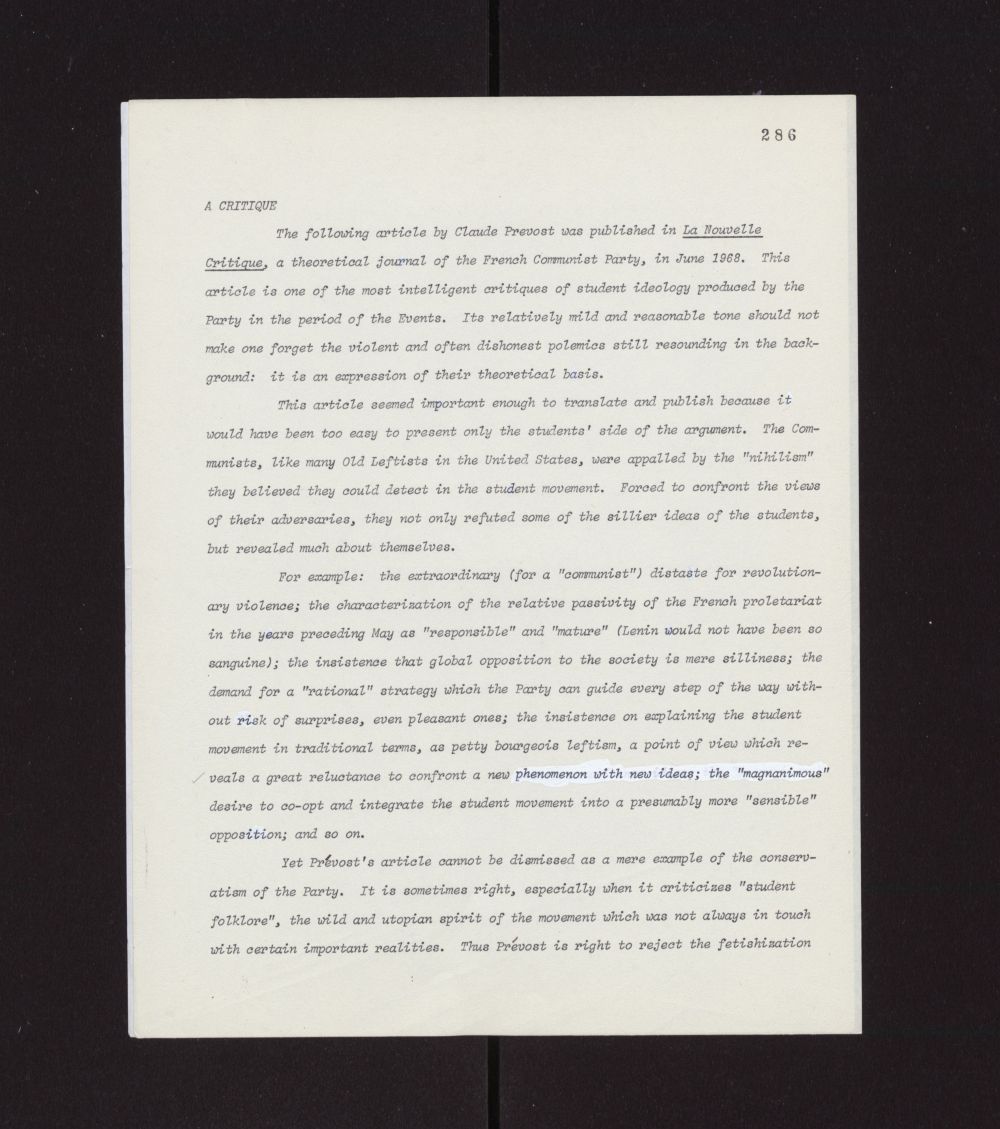

286
A
The following article by Claude Prevost published in La Nouvelle
!/ a theoretical journal of the French Communist Party t in June 1968, This
!/ a theoretical journal of the French Communist Party t in June 1968, This
article is one of the most intelligent critiques of student ideology produced by the
Party in the pepiod of the Events, Its relatively mild and reasonable fofie should not
make one forget the violent and often dishonest polemics still resounding in the back-
make one forget the violent and often dishonest polemics still resounding in the back-
around,: if; is an expression of their theoretical 'basis,
This article seemed important enough to translate and publish because it
would have been too easy to present only the students' side of the argument. The Com-
munists, like many Old Leftists in the United States,, were appalled by the "nihilism"
they believed they could detect in the student movement. Poraed to confront the views
of their adversaries^ they not only refuted some of the sillier* ideas of the students,
but revealed much about themselves,
would have been too easy to present only the students' side of the argument. The Com-
munists, like many Old Leftists in the United States,, were appalled by the "nihilism"
they believed they could detect in the student movement. Poraed to confront the views
of their adversaries^ they not only refuted some of the sillier* ideas of the students,
but revealed much about themselves,
FOP example: the extraordinary (for a "communist") distaste for revolution-
ary violence i the characterisation of the relative passivity of the French proletariat
in the preceding May as "responsible" and "mature" (Lenin would not been so
sanguine); the insistence that global opposition to the society is mere silliness; the
demand for a "rational" strategy which the Parti/ guide every step of the, with-
out risk of surprises f even pleasant the insistence on explaining the student
movement in traditional terms 3 as petty bourgeois leftismt a point of view which re-
veals a great reluctance to confront a with ideas; "magnanimous"
ary violence i the characterisation of the relative passivity of the French proletariat
in the preceding May as "responsible" and "mature" (Lenin would not been so
sanguine); the insistence that global opposition to the society is mere silliness; the
demand for a "rational" strategy which the Parti/ guide every step of the, with-
out risk of surprises f even pleasant the insistence on explaining the student
movement in traditional terms 3 as petty bourgeois leftismt a point of view which re-
veals a great reluctance to confront a with ideas; "magnanimous"
desire to co-opt and integrate the student movement into a presumably mare "sensible"
opposition; so on.
opposition; so on.
lei Provost's article cannot be dismissed as a example of ihe conserv-
atism of ihe Party, It is sometimes right f especially when if criticizes "student
folklore" j ihe wild and Utopian spirit of ihe which not always in touch
with, certain important 'realities. Thus is fight to reject fetishization
atism of ihe Party, It is sometimes right f especially when if criticizes "student
folklore" j ihe wild and Utopian spirit of ihe which not always in touch
with, certain important 'realities. Thus is fight to reject fetishization
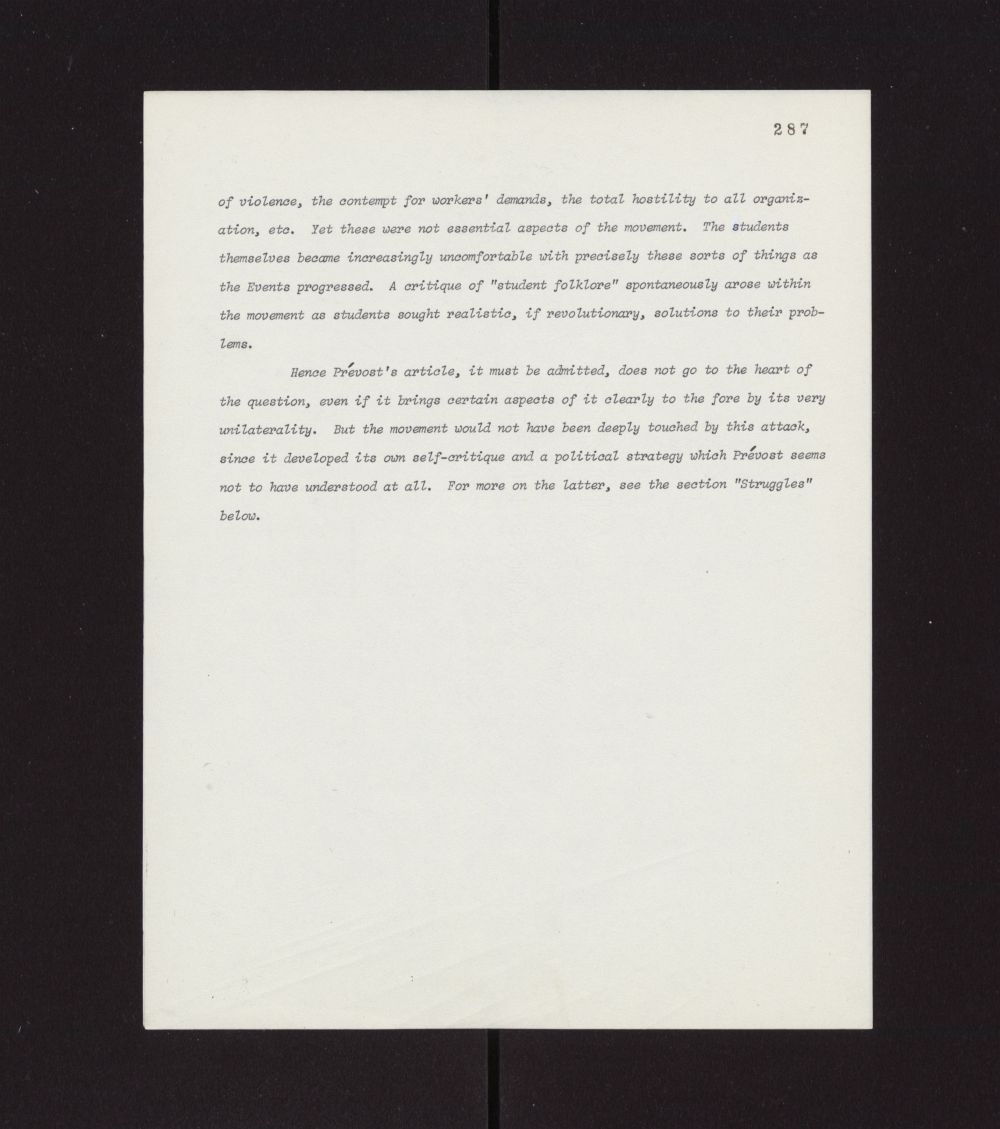

of violence,, the cont&npt for woTkers' demands3 the total hostility to all organiz-
ation, eta, lei these not essential aspects of the. movement. The students
themselves increasingly uncomfortable with precisely these of things as
the Events progressed, A critique of "student folklore" spontaneously arose within
the movement as students sought realistic, if revolutionary, solutions to their prob-
lems.
ation, eta, lei these not essential aspects of the. movement. The students
themselves increasingly uncomfortable with precisely these of things as
the Events progressed, A critique of "student folklore" spontaneously arose within
the movement as students sought realistic, if revolutionary, solutions to their prob-
lems.
Hence Prevostjs article, it must be admitted, not go to the of
the question, if it brings certain aspects of it clearly to the fore by its very
unilaterality. But the movement would not been deeply touched by this attack,
the question, if it brings certain aspects of it clearly to the fore by its very
unilaterality. But the movement would not been deeply touched by this attack,
it developed its own self-critique and a political strategy which Prevost
not to have understood at all. For on the latter, see the section "Struggles"
"below.
not to have understood at all. For on the latter, see the section "Struggles"
"below.
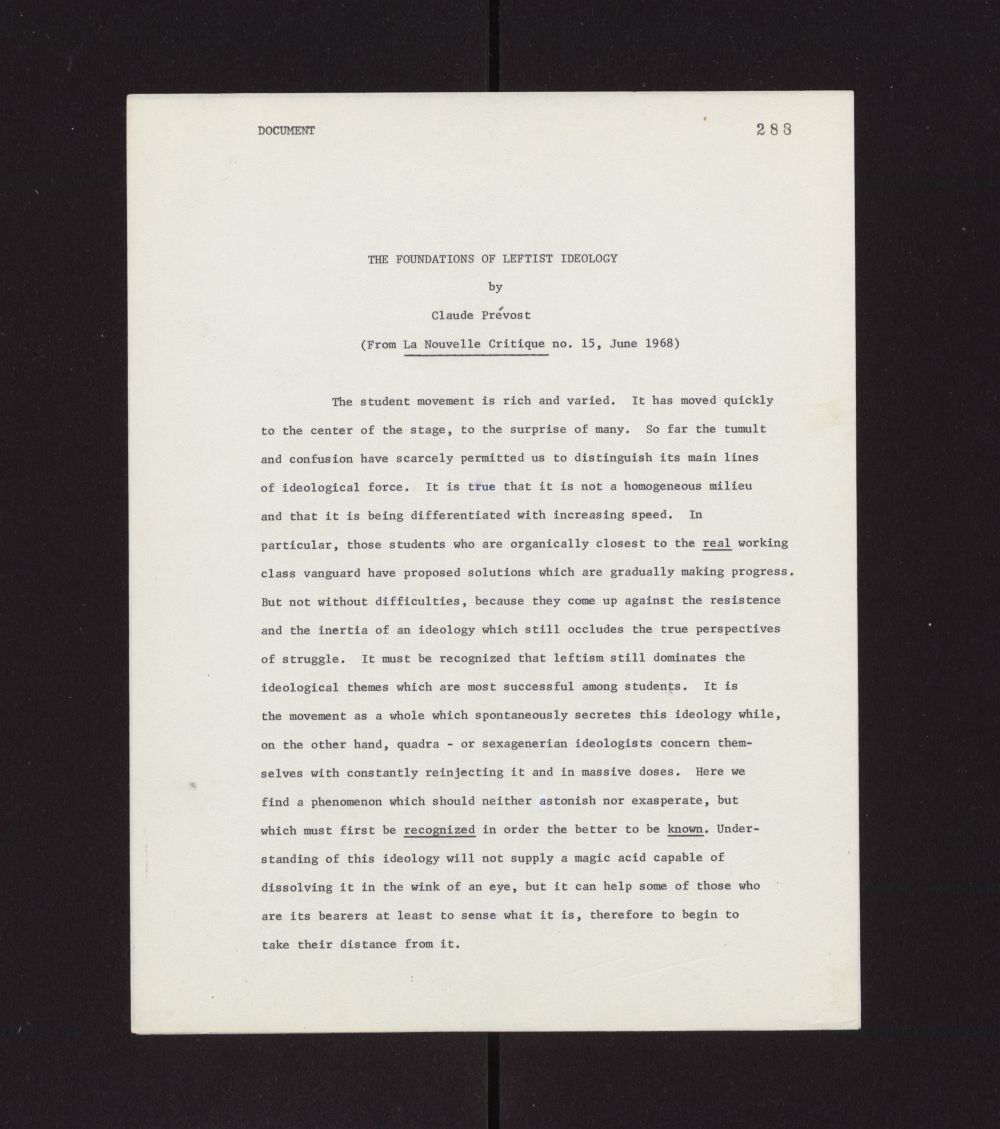

THE FOUNDATIONS OF LEFTIST IDEOLOGY
by
Claude Prevost
(From La Nouvelle Critique no, 15, June 1968)
(From La Nouvelle Critique no, 15, June 1968)
The student movement is rich and varied. It has moved quickly
to the center of the stage, to the surprise of many. So far the tumult
and confusion have scarcely permitted us to distinguish its main lines
of ideological force. It is true that it is not a homogeneous milieu
and that it is being differentiated with increasing speed. In
particular, those students who are organically closest to the rea^l working
class vanguard have proposed solutions which are gradually making progress.
But not without difficulties, because they come up against the resistance
and the inertia of an ideology which still occludes the true perspectives
of struggle. It must be recognized that leftism still dominates the
ideological themes which are most successful among students. It is
the movement as a whole which spontaneously secretes this ideology while,
on the other hand, quadra - or sexagenerian ideologists concern them-
selves with constantly reinjecting it and in massive doses. Here we
find a phenomenon which should neither astonish nor exasperate, but
which must first be recognized in order the better to be known. Under-
standing of this ideology will not supply a magic acid capable of
dissolving it in the wink of an eye, but it can help of those who
are its bearers at least to sense what it is, therefore to begin to
take their distance from it.
to the center of the stage, to the surprise of many. So far the tumult
and confusion have scarcely permitted us to distinguish its main lines
of ideological force. It is true that it is not a homogeneous milieu
and that it is being differentiated with increasing speed. In
particular, those students who are organically closest to the rea^l working
class vanguard have proposed solutions which are gradually making progress.
But not without difficulties, because they come up against the resistance
and the inertia of an ideology which still occludes the true perspectives
of struggle. It must be recognized that leftism still dominates the
ideological themes which are most successful among students. It is
the movement as a whole which spontaneously secretes this ideology while,
on the other hand, quadra - or sexagenerian ideologists concern them-
selves with constantly reinjecting it and in massive doses. Here we
find a phenomenon which should neither astonish nor exasperate, but
which must first be recognized in order the better to be known. Under-
standing of this ideology will not supply a magic acid capable of
dissolving it in the wink of an eye, but it can help of those who
are its bearers at least to sense what it is, therefore to begin to
take their distance from it.
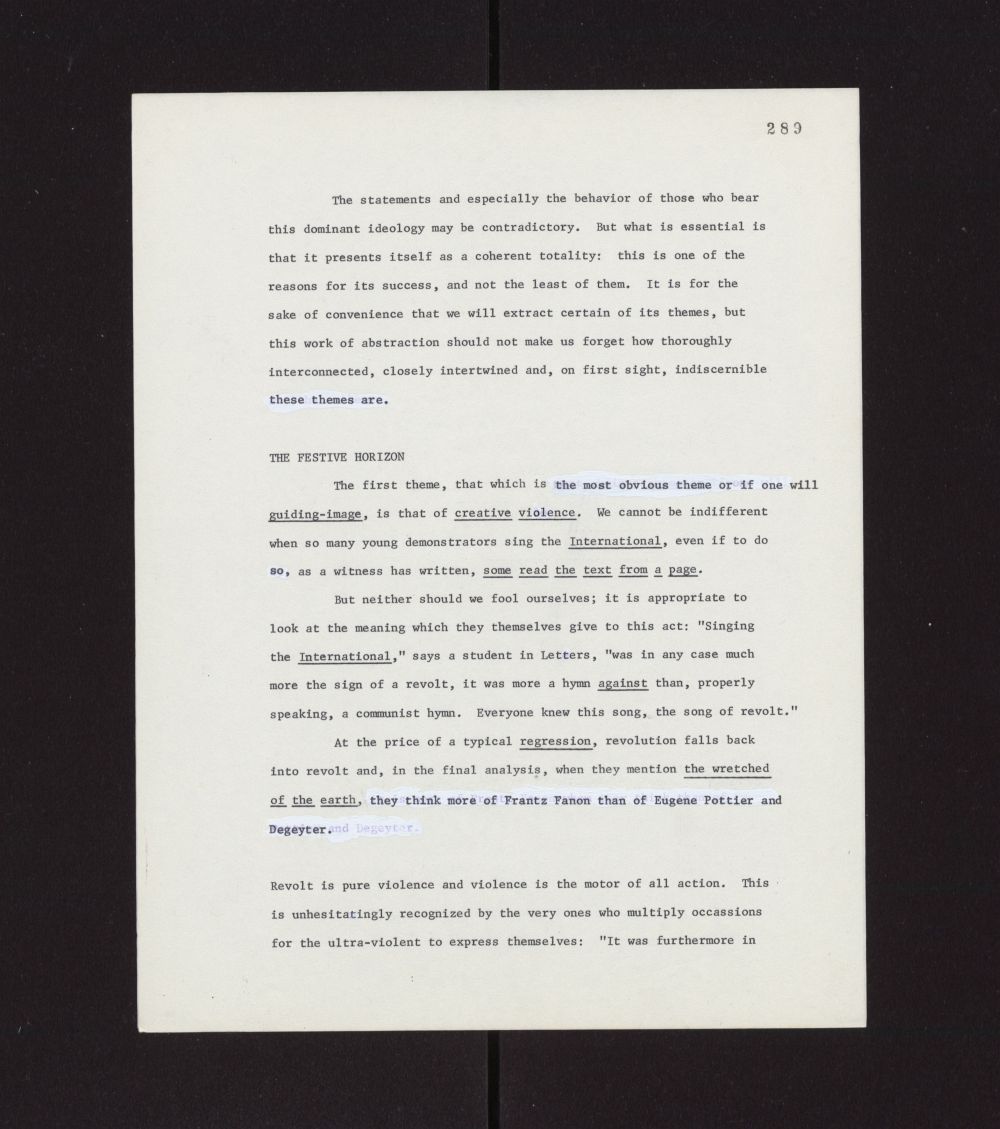

283
The statements and especially the behavior of those who bear
this dominant Ideology may be contradictory. But what is essential is
this dominant Ideology may be contradictory. But what is essential is
that it presents Itself as a coherent totality: this is one of the
reasons for Its success, and not the least of them. It is for the
sake of convenience that we will extract certain of Its themes, but
this work of abstraction should not make us forget how thoroughly
reasons for Its success, and not the least of them. It is for the
sake of convenience that we will extract certain of Its themes, but
this work of abstraction should not make us forget how thoroughly
Interconnected, closely Intertwined and, on first sight, Indiscernible
these are.
these are.
THE FESTIVE HORIZON
The first theme, that which is the obvious or If one will
guiding- Image , Is that of creative violence. We cannot be indifferent
when so many young demonstrators sing the International , even if to do
so, as a witness has written, s ome read the text from a_ page.
guiding- Image , Is that of creative violence. We cannot be indifferent
when so many young demonstrators sing the International , even if to do
so, as a witness has written, s ome read the text from a_ page.
But neither should we fool ourselves; It Is appropriate to
look at the meaning which they themselves give to this act: "Singing
the International , " says a student in Letters, "was in any case much
more the sign of a revolt, it was more a hymn against than, properly
speaking, a communist hymn. Everyone knew this song, the song of revolt,"
look at the meaning which they themselves give to this act: "Singing
the International , " says a student in Letters, "was in any case much
more the sign of a revolt, it was more a hymn against than, properly
speaking, a communist hymn. Everyone knew this song, the song of revolt,"
At the price of a typical regression, revolution falls back
into revolt and, In the final analysis, when they mention the wretched
into revolt and, In the final analysis, when they mention the wretched
2JL lIlS. S5££k> they think more of Frantz Fanon than of Eugene Pettier
Degeyter.
Degeyter.
Revolt is pure violence and violence Is the motor of all action. This
is unhesitatingly recognized by the very ones who multiply occasslons
for the ultra-violent to express themselves: "It was furthermore In
is unhesitatingly recognized by the very ones who multiply occasslons
for the ultra-violent to express themselves: "It was furthermore In
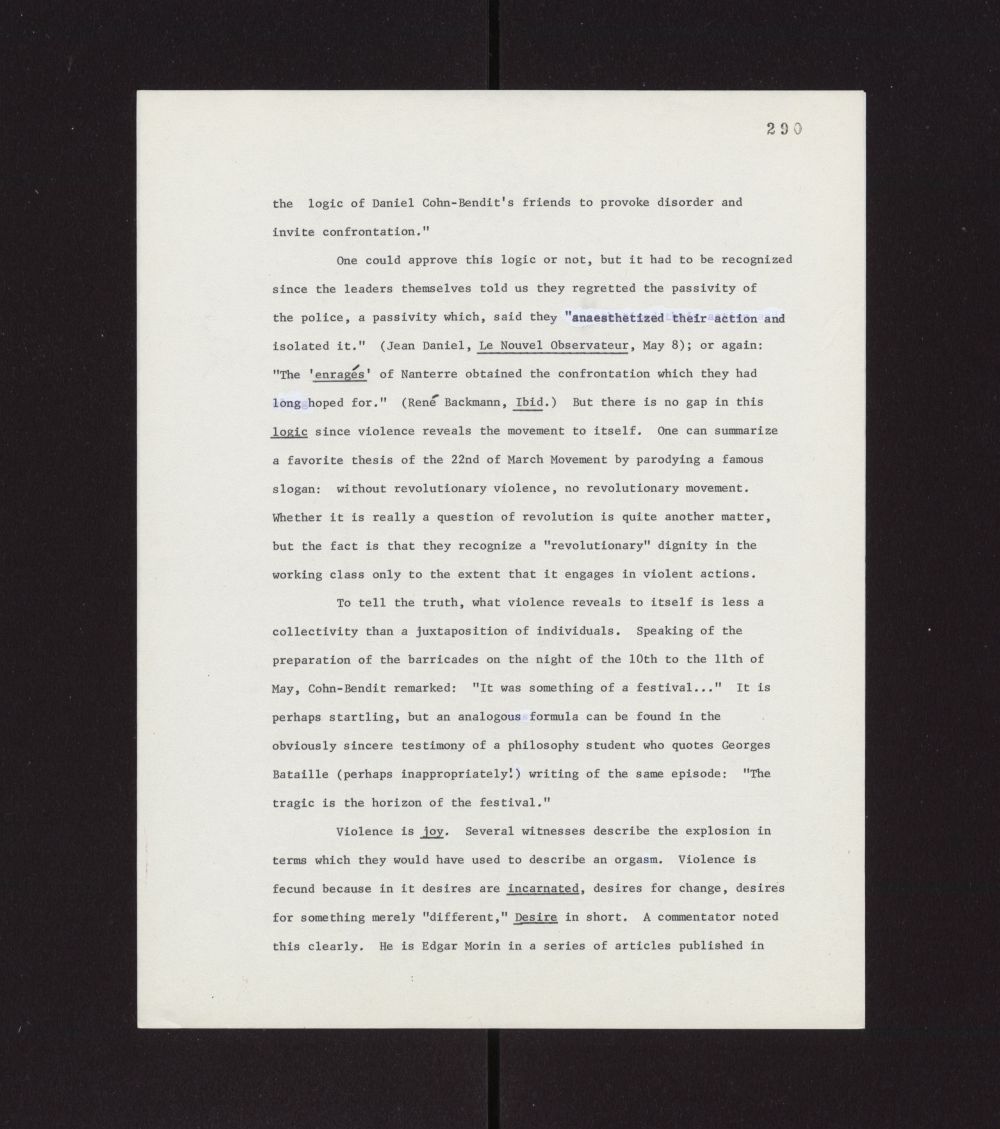

the logic of Daniel Cohn-Bendit1s friends to provoke disorder and
invite confrontation."
invite confrontation."
One could approve this logic or not, but it had to be recognized
since the leaders themselves told us they regretted the passivity of
the police, a passivity which, said they "anaesthetized their action and
isolated it," (Jean Daniel, LsNouyglObservateur, May 8); or again:
"The 'janrages/ of Nanterre obtained the confrontation which they had
long hoped for." (Rene Backmann, Ibid.) But there is no gap in this
Jjogjic since violence reveals the movement to itself. One can summarize
a favorite thesis of the 22nd of March Movement by parodying a famous
slogan: without revolutionary violence, no revolutionary movement.
Whether it is really a question of revolution is quite another matter,
but the fact is that they recognize a "revolutionary" dignity in the
working class only to the extent that it engages in violent actions,
since the leaders themselves told us they regretted the passivity of
the police, a passivity which, said they "anaesthetized their action and
isolated it," (Jean Daniel, LsNouyglObservateur, May 8); or again:
"The 'janrages/ of Nanterre obtained the confrontation which they had
long hoped for." (Rene Backmann, Ibid.) But there is no gap in this
Jjogjic since violence reveals the movement to itself. One can summarize
a favorite thesis of the 22nd of March Movement by parodying a famous
slogan: without revolutionary violence, no revolutionary movement.
Whether it is really a question of revolution is quite another matter,
but the fact is that they recognize a "revolutionary" dignity in the
working class only to the extent that it engages in violent actions,
To tell the truth, what violence reveals to itself is less a
collectivity than a juxtaposition of individuals. Speaking of the
preparation of the barricades on the night of the 10th to the llth of
May, Cohn-Bendit remarked: "It was something of a festival..." It is
perhaps startling, but an analogous formula can be found in the
obviously sincere testimony of a philosophy student who quotes Georges
Bataille (perhaps inappropriately!) writing of the same episode: "The
tragic is the horizon of the festival,"
collectivity than a juxtaposition of individuals. Speaking of the
preparation of the barricades on the night of the 10th to the llth of
May, Cohn-Bendit remarked: "It was something of a festival..." It is
perhaps startling, but an analogous formula can be found in the
obviously sincere testimony of a philosophy student who quotes Georges
Bataille (perhaps inappropriately!) writing of the same episode: "The
tragic is the horizon of the festival,"
Violence is _j_oj[« Several witnesses describe the explosion in
terms which they would have used to describe an orgasm. Violence is
fecund because in it desires are jLncar_n_a.ted. desires for change, desires
for something merely "different," jDgsjjge in short. A commentator noted
this clearly. He is Edgar Morin in a series of articles published in
terms which they would have used to describe an orgasm. Violence is
fecund because in it desires are jLncar_n_a.ted. desires for change, desires
for something merely "different," jDgsjjge in short. A commentator noted
this clearly. He is Edgar Morin in a series of articles published in
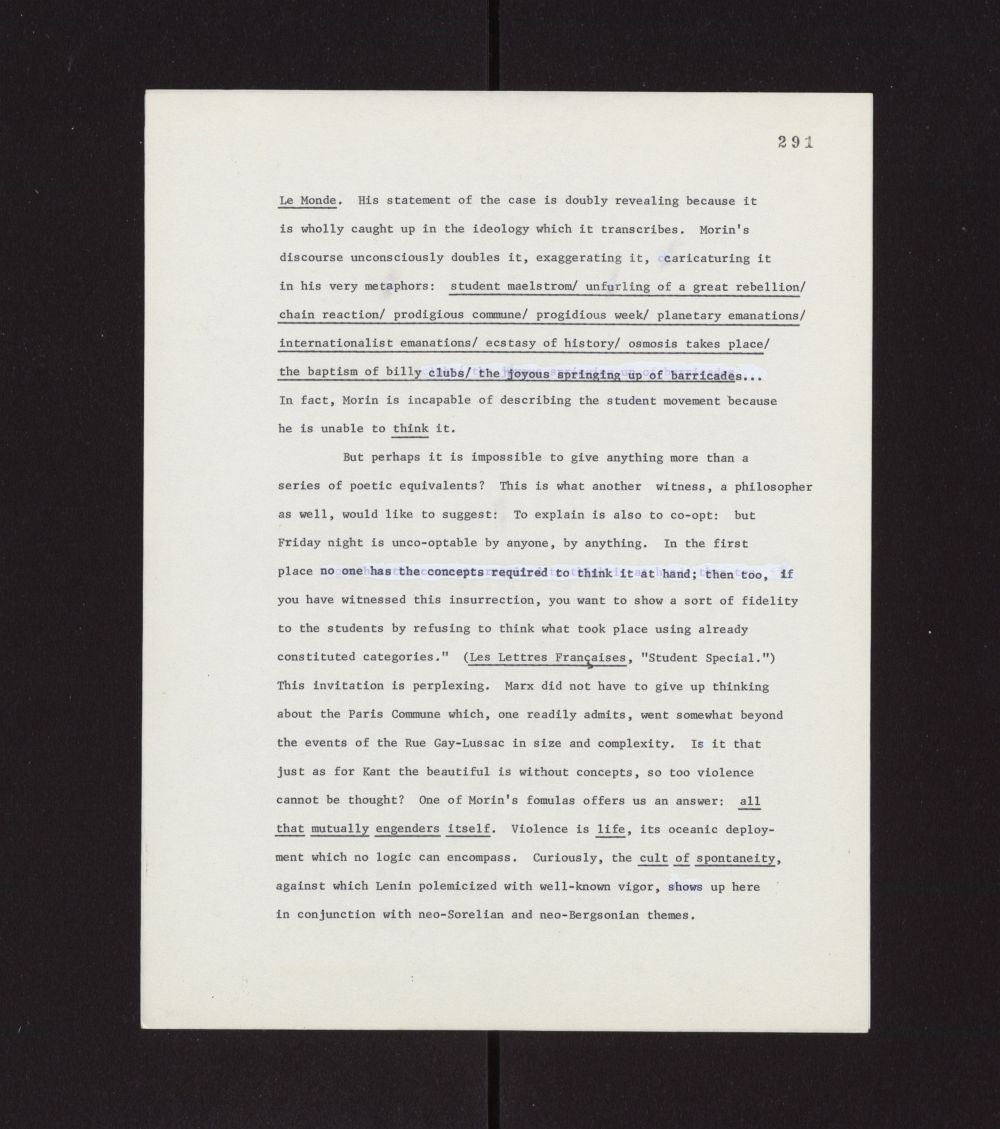

291
Le Monde . His statement of the case is doubly revealing because It
Is wholly caught up in the ideology which It transcribes, Morin's
discourse unconsciously doubles It, exaggerating it, caricaturing it
in his very metaphors : student maelstrom/ unfurling of a great rebellion/
chain reaction/ prodigious commune/ progidious week/ planetary emanations/
Internationalist emanations/ ecstasy of history/ osmosis takes place/
Is wholly caught up in the ideology which It transcribes, Morin's
discourse unconsciously doubles It, exaggerating it, caricaturing it
in his very metaphors : student maelstrom/ unfurling of a great rebellion/
chain reaction/ prodigious commune/ progidious week/ planetary emanations/
Internationalist emanations/ ecstasy of history/ osmosis takes place/
thebaptlsm of
. .
In fact, Morin is incapable of describing the student movement because
lie Is unable to think it,
lie Is unable to think it,
But perhaps it is Impossible to give anything more than a
series of poetic equivalents? This Is what another witness, a philosopher
as well, would like to suggest: To explain Is also to co-opt: but
Friday night is unco-optable by anyone, by anything. In the first
place no one has the concepts to think it at hand; then too, if
you have witnessed this insurrection, you want to show a sort of fidelity
to the students by refusing to think what took place using already
constituted categories," ( Le s^ Le t tres Franca ises , "Student Special,")
This Invitation is perplexing, Marx did not have to give up thinking
about the Paris Commune which, one readily admits, went somewhat beyond
the events of the Rue Gay-Lussac in size and complexity. Is it that
just as for Kant the beautiful is without concepts, so too violence
cannot be thought? One of Morin's fomulas offers us an answer: all
that mutually engenders Itself. Violence is life, its oceanic deploy-
ment which no logic can encompass. Curiously, the cult of spontaneity ,
against which Lenin polemieized with well-known vigor, shows up here
In conjunction with neo-Sorelian and neo-Bergsonian themes,
as well, would like to suggest: To explain Is also to co-opt: but
Friday night is unco-optable by anyone, by anything. In the first
place no one has the concepts to think it at hand; then too, if
you have witnessed this insurrection, you want to show a sort of fidelity
to the students by refusing to think what took place using already
constituted categories," ( Le s^ Le t tres Franca ises , "Student Special,")
This Invitation is perplexing, Marx did not have to give up thinking
about the Paris Commune which, one readily admits, went somewhat beyond
the events of the Rue Gay-Lussac in size and complexity. Is it that
just as for Kant the beautiful is without concepts, so too violence
cannot be thought? One of Morin's fomulas offers us an answer: all
that mutually engenders Itself. Violence is life, its oceanic deploy-
ment which no logic can encompass. Curiously, the cult of spontaneity ,
against which Lenin polemieized with well-known vigor, shows up here
In conjunction with neo-Sorelian and neo-Bergsonian themes,
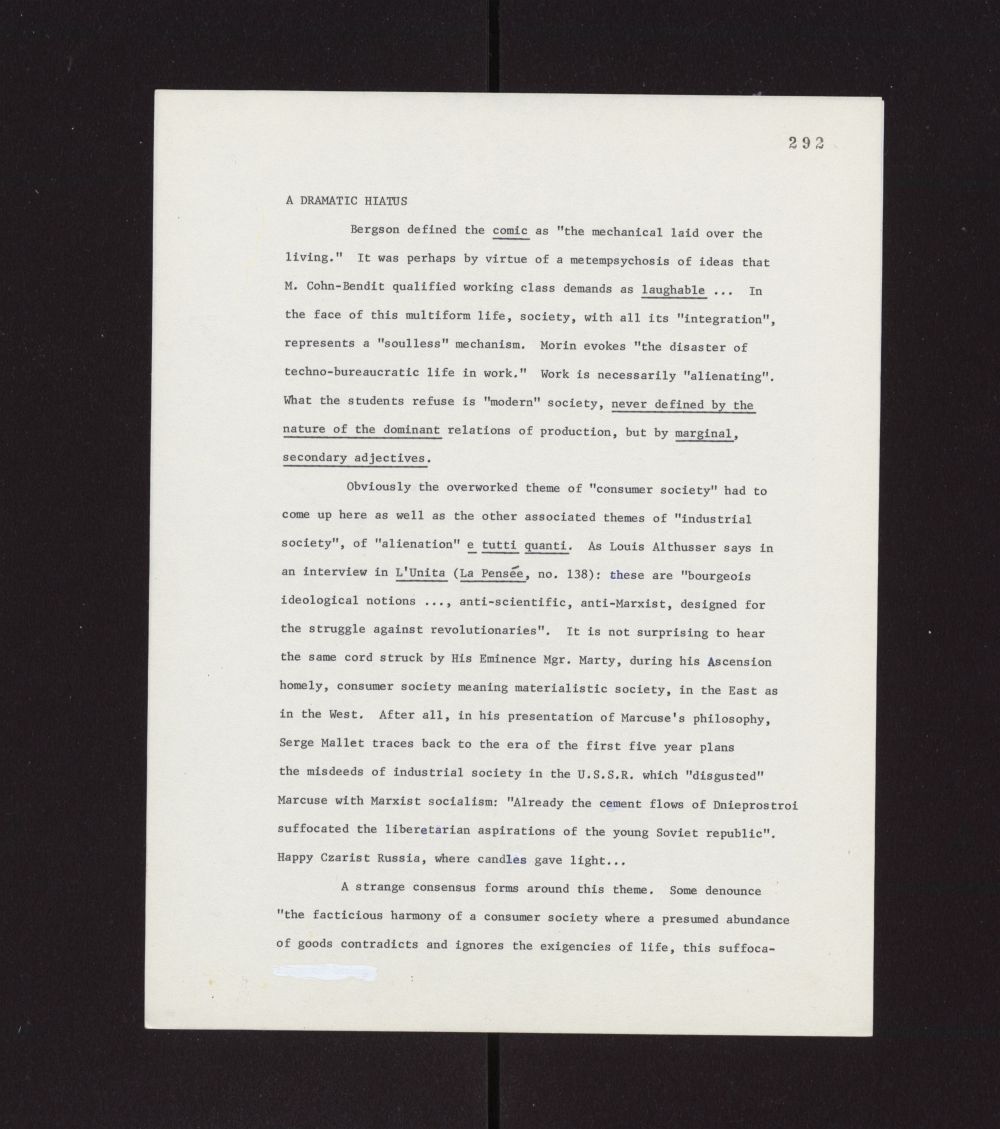

9 Q ''»
10 «_* i-j
A DRAMATIC HIATUS
Bergson defined the comic as "the mechanical laid over the
living," It was perhaps by virtue of a metempsychosis of Ideas that
M, Cohn-Bendlt qualified working class demands as laughable ... In
the face of this multiform life, society, with all its "Integration",
represents a "soulless" mechanism. Morln evokes "the disaster of
techno-bureaucratic life In work," Work Is necessarily "alienating".
What the students refuse Is "modern" society, never definedbjr the
nature ofthedominant relations of production, but by marginal,
secondary adjectives,
living," It was perhaps by virtue of a metempsychosis of Ideas that
M, Cohn-Bendlt qualified working class demands as laughable ... In
the face of this multiform life, society, with all its "Integration",
represents a "soulless" mechanism. Morln evokes "the disaster of
techno-bureaucratic life In work," Work Is necessarily "alienating".
What the students refuse Is "modern" society, never definedbjr the
nature ofthedominant relations of production, but by marginal,
secondary adjectives,
Obviously the overworked theme of "consumer society" had to
come up here as well as the other associated themes of "industrial
society", of "alienation" e tutti quantI. As Louis Althusser says In
an interview in L'Unita (La Pensee, no, 138); these are "bourgeois
Ideological notions ..,, anti-scientific, anti-Marxist, designed for
the struggle against revolutionaries". It is not surprising to hear
the same cord struck by His Eminence Mgr, Marty, during his Ascension
homely, consumer society meaning materialistic society, in the East as
In the West. After all, In his presentation of Marcuse's philosophy,
Serge Mallet traces back to the era of the first five year plans
the misdeeds of Industrial society In the U.S.S.R. which "disgusted"
Marcuse with Marxist socialism,- "Already the cement flows of Dnleprostrol
suffocated the liberetarian aspirations of the young Soviet republic",
Happy Czarlst Russia, where candles gave light...
come up here as well as the other associated themes of "industrial
society", of "alienation" e tutti quantI. As Louis Althusser says In
an interview in L'Unita (La Pensee, no, 138); these are "bourgeois
Ideological notions ..,, anti-scientific, anti-Marxist, designed for
the struggle against revolutionaries". It is not surprising to hear
the same cord struck by His Eminence Mgr, Marty, during his Ascension
homely, consumer society meaning materialistic society, in the East as
In the West. After all, In his presentation of Marcuse's philosophy,
Serge Mallet traces back to the era of the first five year plans
the misdeeds of Industrial society In the U.S.S.R. which "disgusted"
Marcuse with Marxist socialism,- "Already the cement flows of Dnleprostrol
suffocated the liberetarian aspirations of the young Soviet republic",
Happy Czarlst Russia, where candles gave light...
A strange consensus forms around this theme. Some denounce
"the factlcious harmony of a consumer society where a presumed abundance
of goods contradicts and Ignores the exigencies of life, this suffoca-
"the factlcious harmony of a consumer society where a presumed abundance
of goods contradicts and Ignores the exigencies of life, this suffoca-
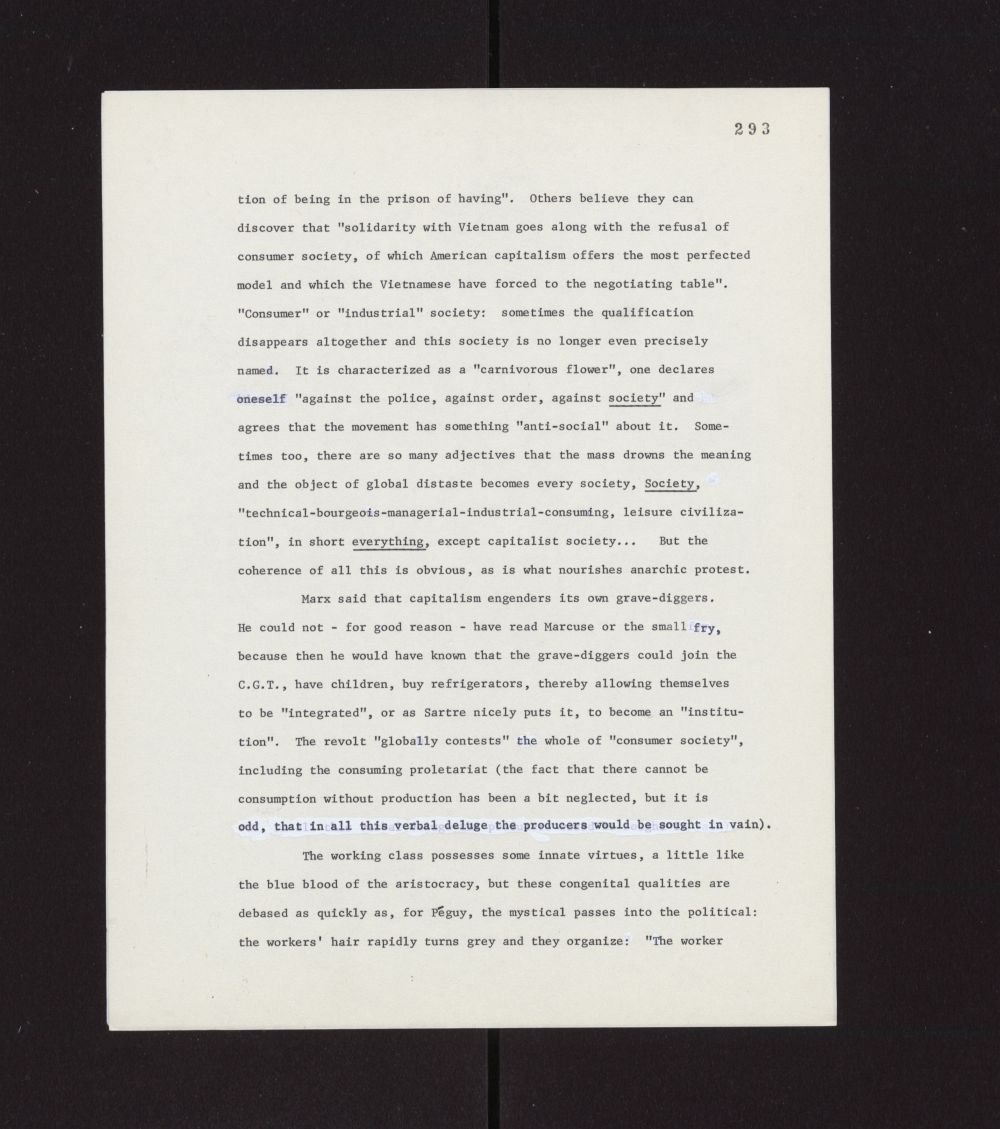

tion of being in the prison of having". Others believe they can
discover that "solidarity with Vietnam goes along with the refusal of
consumer society, of which American capitalism offers the most perfected
model and which the Vietnamese have forced to the negotiating table".
"Consumer" or "industrial" society: sometimes the qualification
disappears altogether and this society is no longer even precisely
named. It is characterized as a "carnivorous flower", one declares
discover that "solidarity with Vietnam goes along with the refusal of
consumer society, of which American capitalism offers the most perfected
model and which the Vietnamese have forced to the negotiating table".
"Consumer" or "industrial" society: sometimes the qualification
disappears altogether and this society is no longer even precisely
named. It is characterized as a "carnivorous flower", one declares
"against the police, against order, against society" and
agrees that the movement has something "anti-social" about it. Some-
times too, there are so many adjectives that the mass drowns the meaning
and the object of global distaste becomes every society. Society.,
"technical-bourgeois-managerial-industrial-consuming, leisure civiliza-
tion", in short everything, except capitalist society.,. But the
coherence of all this is obvious, as is what nourishes anarchic protest,
agrees that the movement has something "anti-social" about it. Some-
times too, there are so many adjectives that the mass drowns the meaning
and the object of global distaste becomes every society. Society.,
"technical-bourgeois-managerial-industrial-consuming, leisure civiliza-
tion", in short everything, except capitalist society.,. But the
coherence of all this is obvious, as is what nourishes anarchic protest,
Marx said that capitalism engenders its own grave-diggers.
He could not - for good reason - have read Marcuse or the small fry,
because then he would have known that the grave-diggers could join the
C.G.T., have children, buy refrigerators, thereby allowing themselves
to be "integrated", or as Sartre nicely puts it, to become an "institu-
tion". The revolt "globally contests" the whole of "consumer society",
including the consuming proletariat (the fact that there cannot be
consumption without production has been a bit neglected, but it is
odd, that in all this verbal deluge the producers would be sought in vain).
He could not - for good reason - have read Marcuse or the small fry,
because then he would have known that the grave-diggers could join the
C.G.T., have children, buy refrigerators, thereby allowing themselves
to be "integrated", or as Sartre nicely puts it, to become an "institu-
tion". The revolt "globally contests" the whole of "consumer society",
including the consuming proletariat (the fact that there cannot be
consumption without production has been a bit neglected, but it is
odd, that in all this verbal deluge the producers would be sought in vain).
The working class possesses some innate virtues, a little like
the blue blood of the aristocracy, but these congenital qualities are
debased as quickly as, for Peguy, the mystical passes into the political:
the workers' hair rapidly turns grey and they organize: "The worker
the blue blood of the aristocracy, but these congenital qualities are
debased as quickly as, for Peguy, the mystical passes into the political:
the workers' hair rapidly turns grey and they organize: "The worker
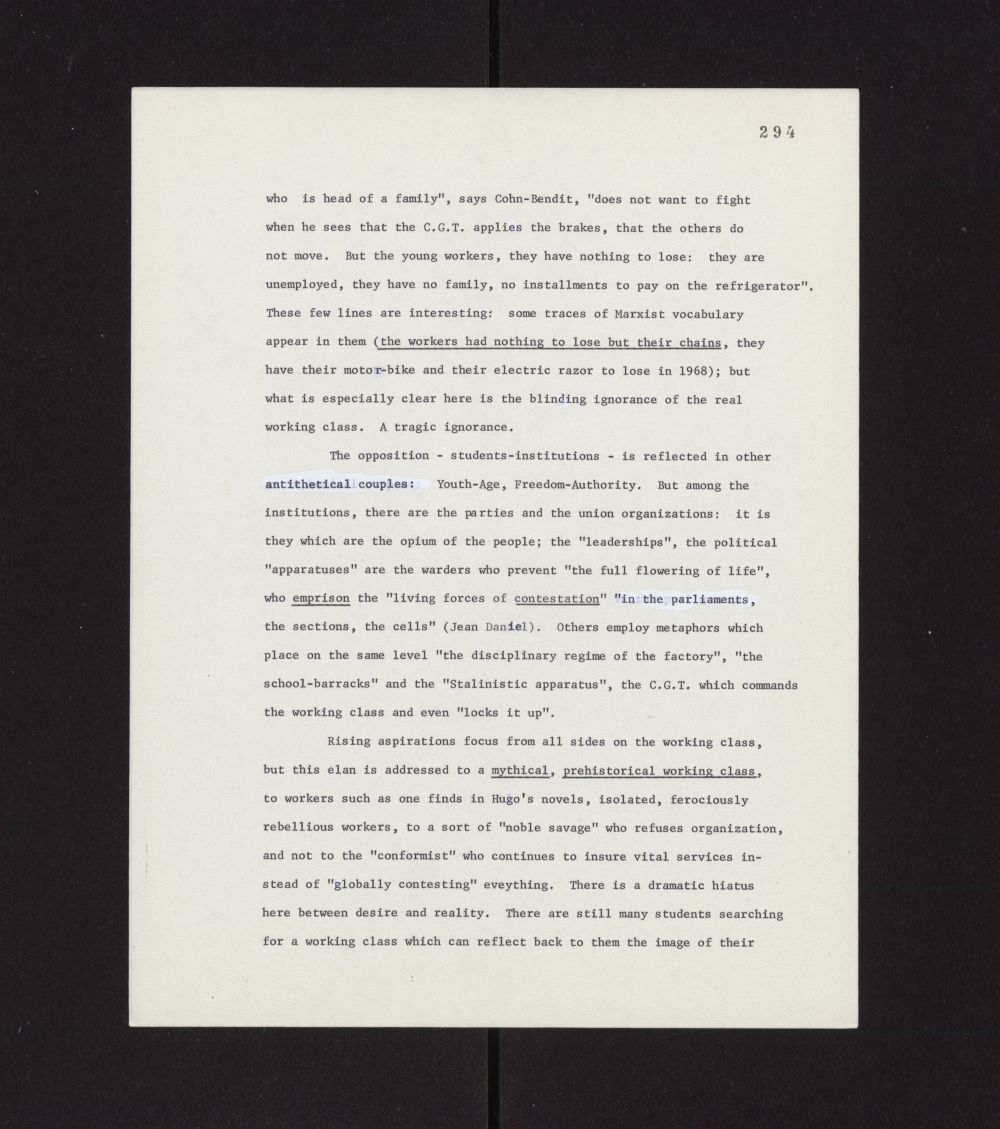

who is head of a family", says Cohn-Bendit, "does not want to fight
when he sees that the C.G.T. applies the brakes, that the others do
not move. But the young workers, they have nothing to lose: they are
unemployed, they have no family, no installments to pay on the refrigerator",
These few lines are interesting: some traces of Marxist vocabulary
appear in them (Jthe_wOj£kj3jrs^^ , they
unemployed, they have no family, no installments to pay on the refrigerator",
These few lines are interesting: some traces of Marxist vocabulary
appear in them (Jthe_wOj£kj3jrs^^ , they
have their motor-bike and their electric razor to lose in 1968); but
what is especially clear here is the blinding ignorance of the real
working class. A tragic ignorance.
what is especially clear here is the blinding ignorance of the real
working class. A tragic ignorance.
The opposition - students-Institutions - is reflected in other
antithetical couples: Youth-Age, Freedom-Authority. But among the
institutions, there are the parties and the union organizations: it is
they which are the opium of the people; the "leaderships", the political
"apparatuses" are the warders who prevent "the full flowering of life",
w^° _gfflpi£ii:Son. the "living forces of contestation'' "in the parliaments,
the sections, the cells" (Jean Daniel), Others employ metaphors which
place on the same level "the disciplinary regime of the factory", "the
school-barracks" and the "Stalinistic apparatus", the C.G.T. which commands
the working class and even "locks it up".
antithetical couples: Youth-Age, Freedom-Authority. But among the
institutions, there are the parties and the union organizations: it is
they which are the opium of the people; the "leaderships", the political
"apparatuses" are the warders who prevent "the full flowering of life",
w^° _gfflpi£ii:Son. the "living forces of contestation'' "in the parliaments,
the sections, the cells" (Jean Daniel), Others employ metaphors which
place on the same level "the disciplinary regime of the factory", "the
school-barracks" and the "Stalinistic apparatus", the C.G.T. which commands
the working class and even "locks it up".
Rising aspirations focus from all sides on the working class,
but this elan is addressed to a myjihical^ _grehjis_torical _workinj^c_las£[,
to workers such as one finds in Hugo's novels, isolated, ferociously
rebellious workers, to a sort of "noble savage" who refuses organization,
and not to the "conformist" who continues to insure vital services in-
stead of "globally contesting" eveything. There is a dramatic hiatus
here between desire and reality. There are still many students searching
for a working class which can reflect back to them the image of their
but this elan is addressed to a myjihical^ _grehjis_torical _workinj^c_las£[,
to workers such as one finds in Hugo's novels, isolated, ferociously
rebellious workers, to a sort of "noble savage" who refuses organization,
and not to the "conformist" who continues to insure vital services in-
stead of "globally contesting" eveything. There is a dramatic hiatus
here between desire and reality. There are still many students searching
for a working class which can reflect back to them the image of their
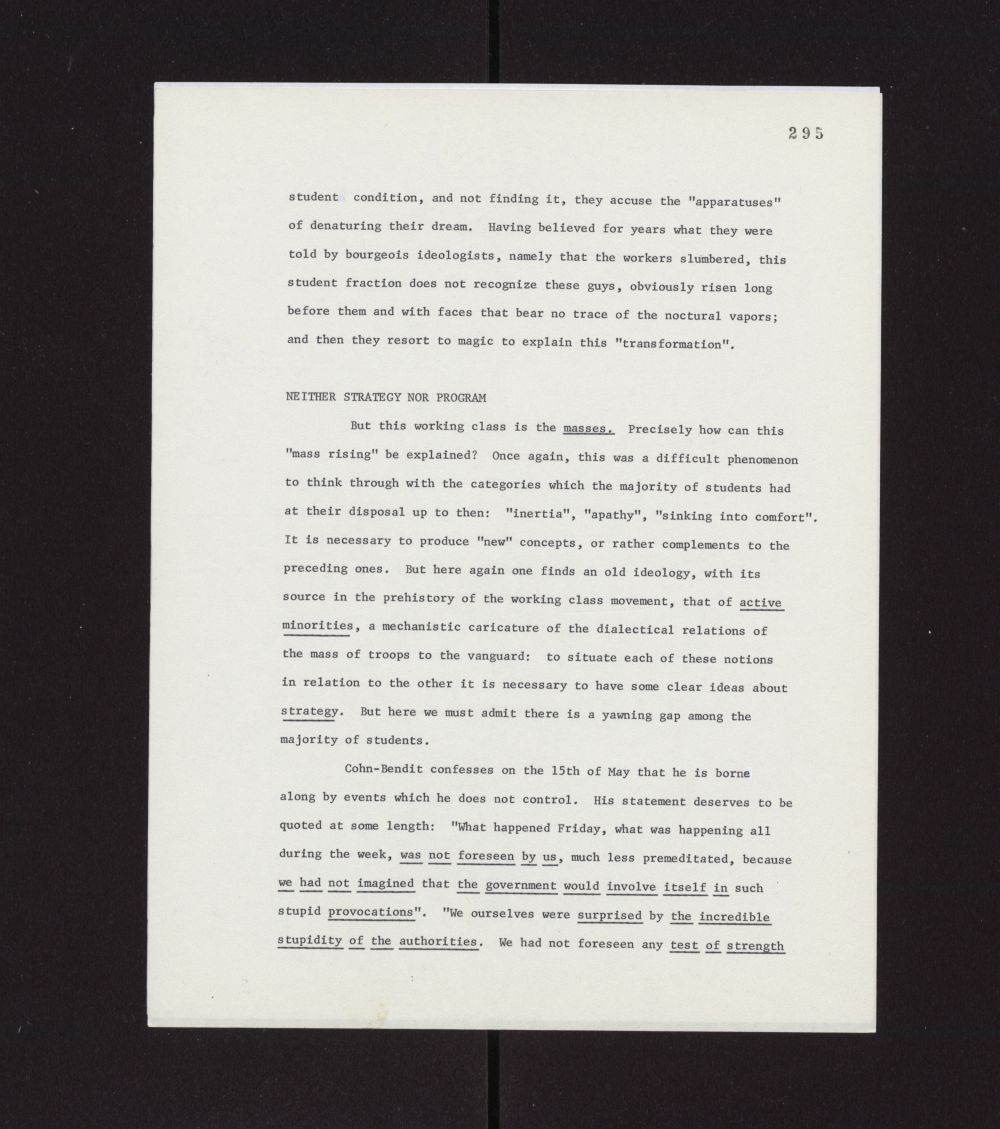

295
student condition, and not finding it, they accuse the "apparatuses"
of denaturing their dream. Having believed for years what they were
told by bourgeois ideologists, namely that the workers slumbered, this
student fraction does not recognize these guys, obviously risen long
before them and with faces that bear no trace of the noctural vapors;
and then they resort to magic to explain this "transformation".
of denaturing their dream. Having believed for years what they were
told by bourgeois ideologists, namely that the workers slumbered, this
student fraction does not recognize these guys, obviously risen long
before them and with faces that bear no trace of the noctural vapors;
and then they resort to magic to explain this "transformation".
STRATEGY NOR
But this working class is the masses^ Precisely how can this
"mass rising" be explained? Once again, this was a difficult phenomenon
to think through with the categories which the majority of students had
at their disposal up to then: "inertia", "apathy", "sinking into comfort",
It is necessary to produce "new" concepts, or rather complements to the
preceding ones. But here again one finds an old ideology, with its
source in the prehistory of the working class movement, that of active
minorities, a mechanistic caricature of the dialectical relations of
the mass of troops to the vanguard; to situate each of these notions
in relation to the other it is necessary to have some clear ideas about
strategy. But here we must admit there is a yawning gap among the
majority of students.
"mass rising" be explained? Once again, this was a difficult phenomenon
to think through with the categories which the majority of students had
at their disposal up to then: "inertia", "apathy", "sinking into comfort",
It is necessary to produce "new" concepts, or rather complements to the
preceding ones. But here again one finds an old ideology, with its
source in the prehistory of the working class movement, that of active
minorities, a mechanistic caricature of the dialectical relations of
the mass of troops to the vanguard; to situate each of these notions
in relation to the other it is necessary to have some clear ideas about
strategy. But here we must admit there is a yawning gap among the
majority of students.
Cohn-Bendit confesses on the 15th of May that he is borne
along by events which he does not control. His statement deserves to be
quoted at some length: "What happened Friday, what was happening all
during the week, was not foreseen by us, much less premeditated, because
we had not imagined^ that the government would involve itseIf in such
stupid provocations^'. "We ourselves were surprised by the incredible
sj:up_idity of the authorities. We had not foreseen any test of strength
along by events which he does not control. His statement deserves to be
quoted at some length: "What happened Friday, what was happening all
during the week, was not foreseen by us, much less premeditated, because
we had not imagined^ that the government would involve itseIf in such
stupid provocations^'. "We ourselves were surprised by the incredible
sj:up_idity of the authorities. We had not foreseen any test of strength
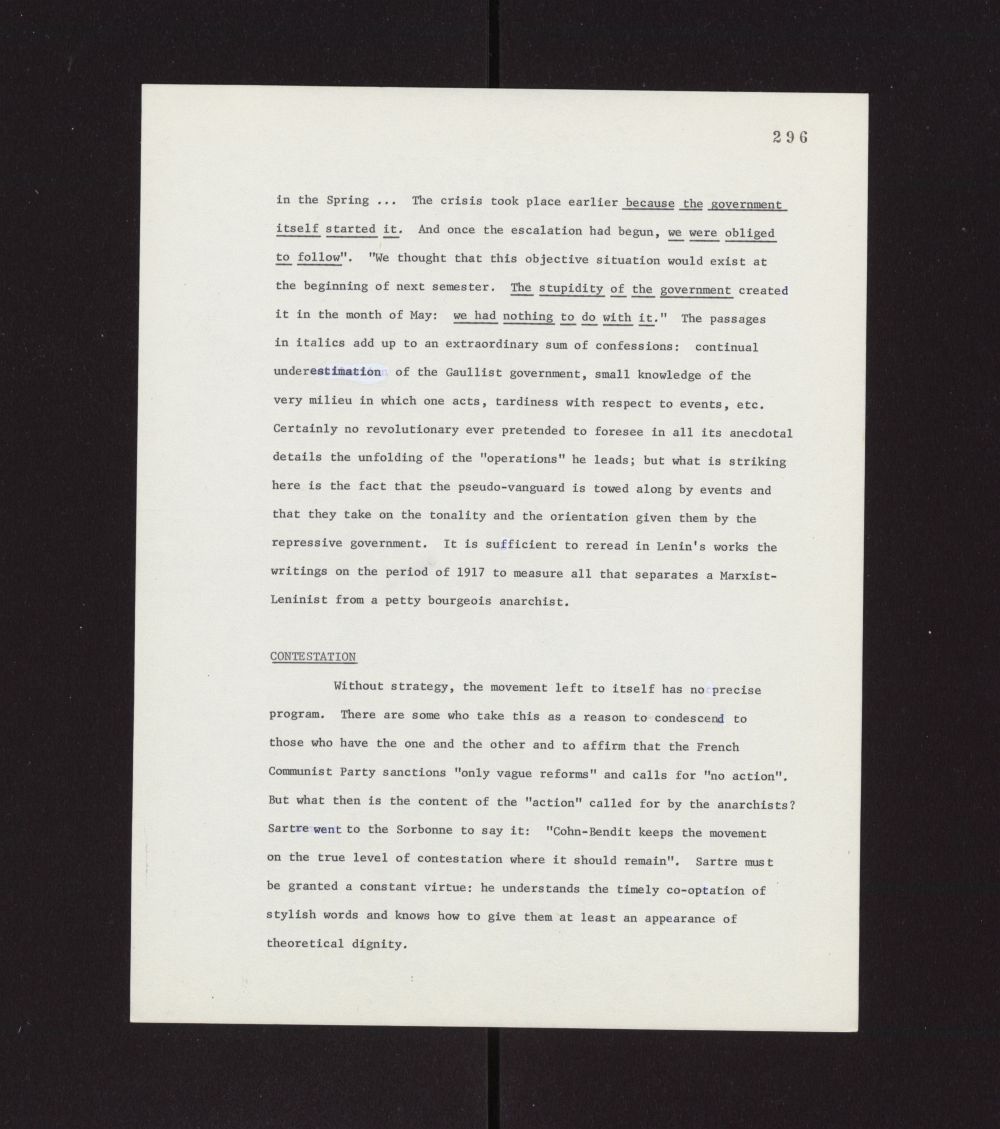

296
In the Spring ... The crisis took place earlier J«2cause Jthe
itself started It, And once the escalation had begun, we were obliged
to follow" . "We thought that this objective situation would exist at
the beginning of next semester. The stupidity of the government created
It in the month of May; ^£_h£d_ £othing to do with It." The passages
in Italics add up to an extraordinary sum of confessions: continual
underestimation of the Gaul list government, small knowledge of the
very milieu In which one acts, tardiness with respect to events, etc.
Certainly no revolutionary ever pretended to foresee In all Its anecdotal
details the unfolding of the "operations" he leads; but what is striking
here is the fact that the pseudo-vanguard is towed along by events and
that they take on the tonality and the orientation given them by the
repressive government. It Is sufficient to reread in Lenin's works the
writings on the period of 1917 to measure all that separates a Marxist-
Leninist from a petty bourgeois anarchist,
to follow" . "We thought that this objective situation would exist at
the beginning of next semester. The stupidity of the government created
It in the month of May; ^£_h£d_ £othing to do with It." The passages
in Italics add up to an extraordinary sum of confessions: continual
underestimation of the Gaul list government, small knowledge of the
very milieu In which one acts, tardiness with respect to events, etc.
Certainly no revolutionary ever pretended to foresee In all Its anecdotal
details the unfolding of the "operations" he leads; but what is striking
here is the fact that the pseudo-vanguard is towed along by events and
that they take on the tonality and the orientation given them by the
repressive government. It Is sufficient to reread in Lenin's works the
writings on the period of 1917 to measure all that separates a Marxist-
Leninist from a petty bourgeois anarchist,
COgTESTATION
Without strategy, the movement left to Itself has no precise
program. There are some who take this as a reason to condescend to
those who have the one and the other and to affirm that the French
Communist Party sanctions "only vague reforms" and calls for "no action",
But what then Is the content of the "action" called for by the anarchists?
Sartre went to the Sorbonne to say It: "Cohn-Bendit keeps the movement
on the true level of contestation where it should remain", Sartre must
be granted a constant virtue; he understands the timely co-optation of
stylish words and knows how to give them at least an appearance of
theoretical dignity.
program. There are some who take this as a reason to condescend to
those who have the one and the other and to affirm that the French
Communist Party sanctions "only vague reforms" and calls for "no action",
But what then Is the content of the "action" called for by the anarchists?
Sartre went to the Sorbonne to say It: "Cohn-Bendit keeps the movement
on the true level of contestation where it should remain", Sartre must
be granted a constant virtue; he understands the timely co-optation of
stylish words and knows how to give them at least an appearance of
theoretical dignity.
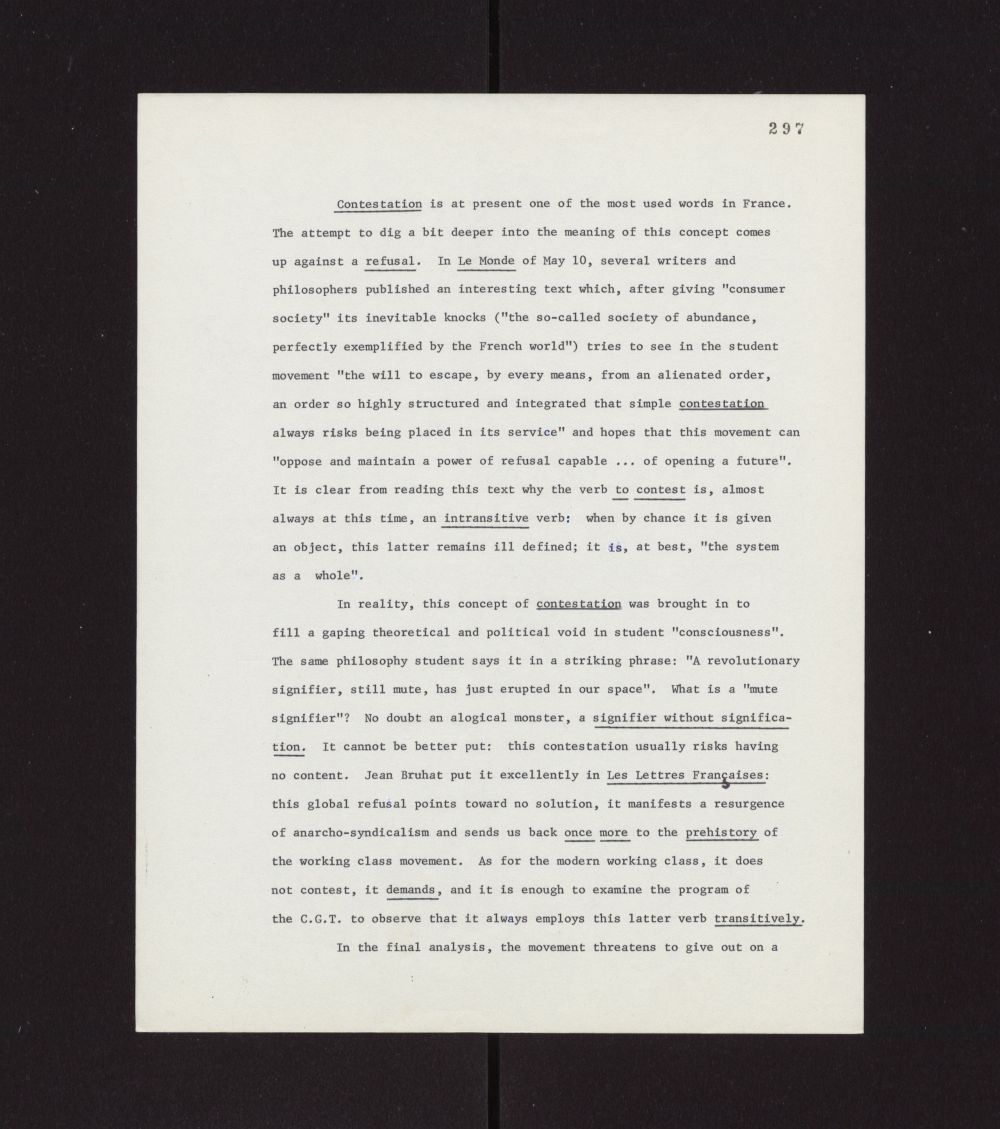

2 9 7
Contestation Is at present one of the most used words In France,
The attempt to dig a bit deeper Into the meaning of this concept comes
up against a refusal. In Le Monde of May 10, several writers and
philosophers published an interesting text which, after giving "consumer
society" its Inevitable knocks ("the so-called society of abundance,
perfectly exemplified by the French world") tries to see In the student
movement "the will to escape, by every means, from an alienated order,
an order so highly structured and integrated that simple contegtafcign
always risks being placed In its service" and hopes that this movement can
"oppose and maintain a power of refusal capable ... of opening a future".
It is clear from reading this text why the verb to contest Is, almost
always at this time, an Intransitive verb; when by chance It is given
an object, this latter remains ill defined; It is, at best, "the system
as a whole",
The attempt to dig a bit deeper Into the meaning of this concept comes
up against a refusal. In Le Monde of May 10, several writers and
philosophers published an interesting text which, after giving "consumer
society" its Inevitable knocks ("the so-called society of abundance,
perfectly exemplified by the French world") tries to see In the student
movement "the will to escape, by every means, from an alienated order,
an order so highly structured and integrated that simple contegtafcign
always risks being placed In its service" and hopes that this movement can
"oppose and maintain a power of refusal capable ... of opening a future".
It is clear from reading this text why the verb to contest Is, almost
always at this time, an Intransitive verb; when by chance It is given
an object, this latter remains ill defined; It is, at best, "the system
as a whole",
In reality, this concept of cjajitesjraj^ijgrj was brought in to
fill a gaping theoretical and political void In student "consciousness",
The same philosophy student says it in a striking phrase: "A revolutionary
signifier, still mute, has just erupted In our space". What Is a "mute
signlfier"? No doubt an alogical monster, a signifier without significa-
tion, It cannot be better put: this contestation usually risks having
The same philosophy student says it in a striking phrase: "A revolutionary
signifier, still mute, has just erupted In our space". What Is a "mute
signlfier"? No doubt an alogical monster, a signifier without significa-
tion, It cannot be better put: this contestation usually risks having
no content, Jean Bruhat put It excellently In Les Lettres Francatses:
...... ~" ~":j: ....... ~ : " ........ ; = ~ ..... ~ ....... 9 ~ ...............................
this global refusal points toward no solution, it manifests a resurgence
of anarcho-syndicalism and sends us back once more to the prehistory of
the working class movement. As for the modern working class, It does
not contest, It demands, and It Is enough to examine the program of
the C.G.T. to observe that It always employs this latter verb transitively.
In the final analysis, the movement threatens to give out on a
of anarcho-syndicalism and sends us back once more to the prehistory of
the working class movement. As for the modern working class, It does
not contest, It demands, and It Is enough to examine the program of
the C.G.T. to observe that It always employs this latter verb transitively.
In the final analysis, the movement threatens to give out on a
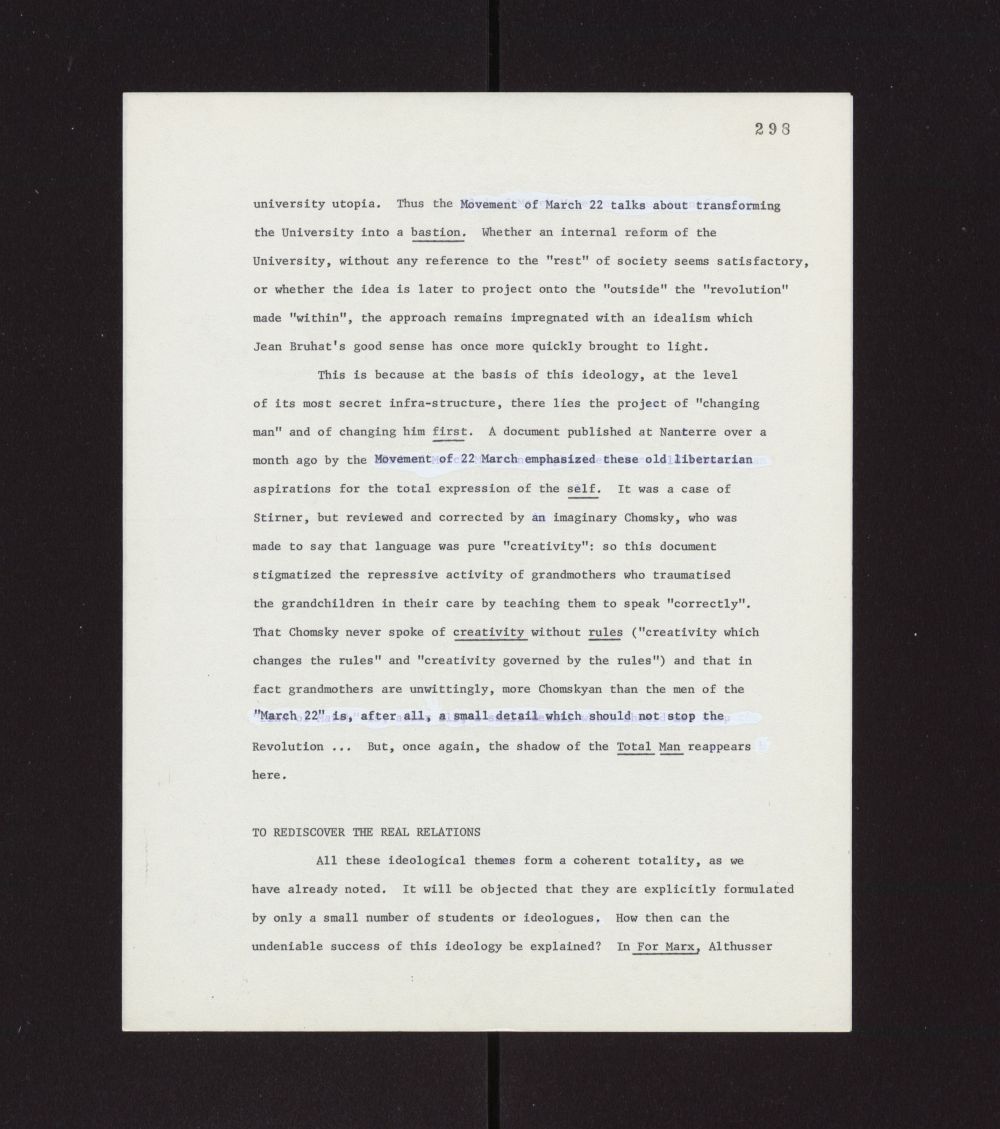

298
university Utopia, Thus the of 22 talks about transforming
the University Into a bastion, 'Whether an internal reform of the
University, without any reference to the "rest" of society seems satisfactory,
or whether the Idea Is later to project onto the "outside" the "revolution"
made "within", the approach remains impregnated with an idealism which
Jean Bruhat's good sense has once more quickly brought to light.
the University Into a bastion, 'Whether an internal reform of the
University, without any reference to the "rest" of society seems satisfactory,
or whether the Idea Is later to project onto the "outside" the "revolution"
made "within", the approach remains impregnated with an idealism which
Jean Bruhat's good sense has once more quickly brought to light.
This Is because at the basis of this ideology, at the level
of its most secret Infra-structure, there lies the project of "changing
man" and of changing him first, A document published at Nanterre over a
month ago by the of 22 March emphasized old libertarian
aspirations for the total expression of the self. It was a case of
Stirner, but reviewed and corrected by an Imaginary Chomsky, who was
made to say that language was pure "creativity": so this document
stigmatized the repressive activity of grandmothers who traumatlsed
the grandchildren In their care by teaching them to speak "correctly",
That Chomsky never spoke of creativity without rules ("creativity which
changes the rules" and "creativity governed by the rules") and that In
fact grandmothers are unwittingly, more Chomskyan than the men of the
"March 22" Is, after all, a small detail which should not stop the
of its most secret Infra-structure, there lies the project of "changing
man" and of changing him first, A document published at Nanterre over a
month ago by the of 22 March emphasized old libertarian
aspirations for the total expression of the self. It was a case of
Stirner, but reviewed and corrected by an Imaginary Chomsky, who was
made to say that language was pure "creativity": so this document
stigmatized the repressive activity of grandmothers who traumatlsed
the grandchildren In their care by teaching them to speak "correctly",
That Chomsky never spoke of creativity without rules ("creativity which
changes the rules" and "creativity governed by the rules") and that In
fact grandmothers are unwittingly, more Chomskyan than the men of the
"March 22" Is, after all, a small detail which should not stop the
Revolution ... But, once again, the shadow of the Total Man reappears
here.
here.
TO REDISCOVER THE REAL RELATIONS
All these Ideological themes form a coherent totality, as we
have already noted. It will be objected that they are explicitly formulated
by only a small number of students or ideologues. How then can the
undeniable success of this Ideology be explained? In For Marx, Althusser
have already noted. It will be objected that they are explicitly formulated
by only a small number of students or ideologues. How then can the
undeniable success of this Ideology be explained? In For Marx, Althusser
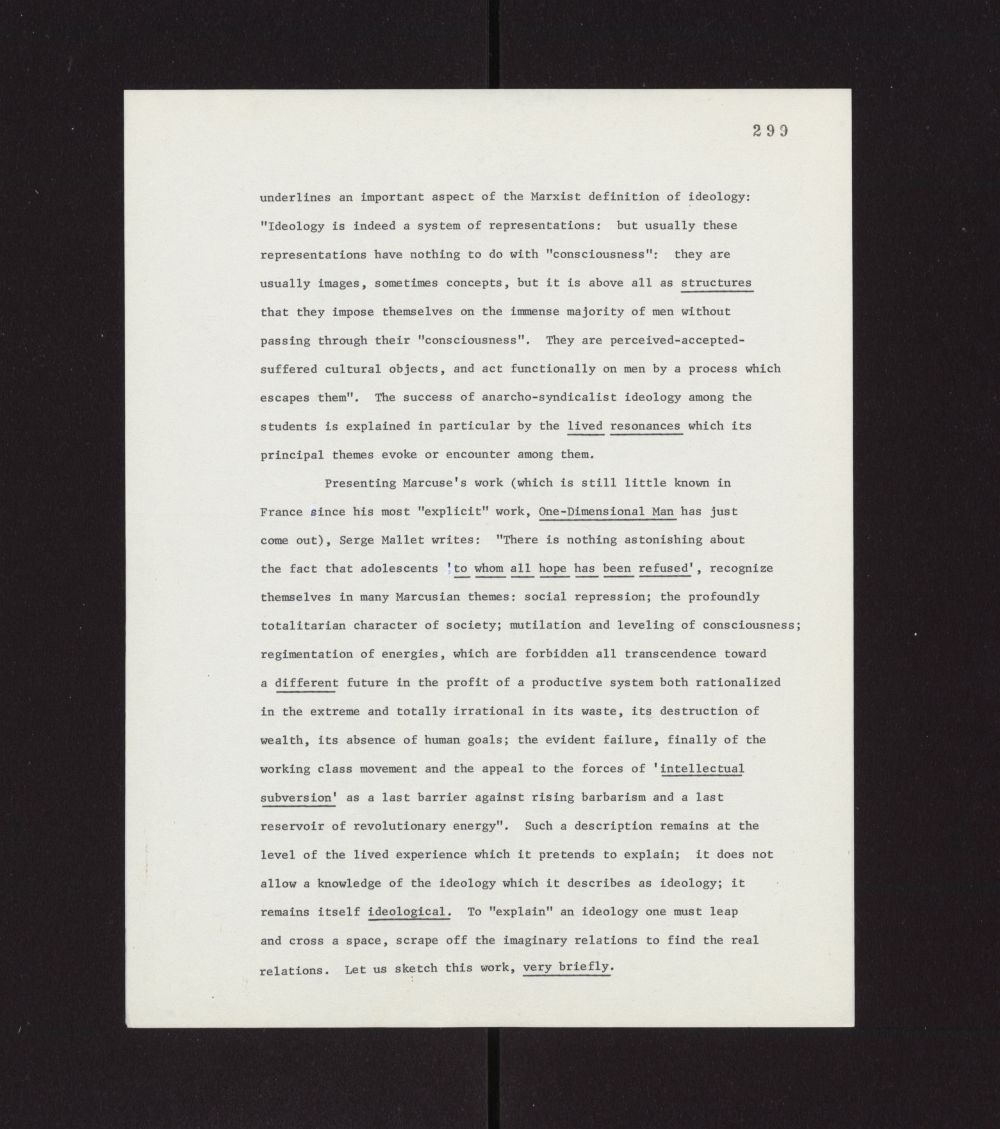

underlines an Important aspect of the Marxist definition of ideology:
"Ideology is indeed a system of representations: but usually these
representations have nothing to do with "consciousness": they are
usually images, sometimes concepts, but it is above all as structures
that they impose themselves on the immense majority of men without
passing through their "consciousness". They are pereeived-accepted-
suffared cultural objects, and act functionally on men by a process which
escapes them". The success of anarcho-syndicalist Ideology among the
students is explained in particular by the lived resonances which its
principal themes evoke or encounter among them,
"Ideology is indeed a system of representations: but usually these
representations have nothing to do with "consciousness": they are
usually images, sometimes concepts, but it is above all as structures
that they impose themselves on the immense majority of men without
passing through their "consciousness". They are pereeived-accepted-
suffared cultural objects, and act functionally on men by a process which
escapes them". The success of anarcho-syndicalist Ideology among the
students is explained in particular by the lived resonances which its
principal themes evoke or encounter among them,
Presenting Marcuse's work (which is still little known in
France since his most "explicit" work, One-Dimensional Man has just
come out), Serge Mallet writes: "There is nothing astonishing about
the fact that adolescents 'to whom all hope has been refused', recognize
themselves in many Marcusian themes: social repression; the profoundly
totalitarian character of society; mutilation and leveling of consciousness;
regimentation of energies, which are forbidden all transcendence toward
a different future In the profit of a productive system both rationalized
In the extreme and totally irrational In its waste, its destruction of
wealth, its absence of human goals; the evident failure, finally of the
working class movement and the appeal to the forces of 'Intellectual
subversion' as a last barrier against rising barbarism and a last
reservoir of revolutionary energy". Such a description remains at the
level of the lived experience which it pretends to explain; It does not
allow a knowledge of the ideology which It describes as ideology; it
remains Itself Ideo1o gica1. To "explain" an Ideology one must leap
and cross a space, scrape off the Imaginary relations to find the real
relations. Let us sketch this work, verybriefly.
France since his most "explicit" work, One-Dimensional Man has just
come out), Serge Mallet writes: "There is nothing astonishing about
the fact that adolescents 'to whom all hope has been refused', recognize
themselves in many Marcusian themes: social repression; the profoundly
totalitarian character of society; mutilation and leveling of consciousness;
regimentation of energies, which are forbidden all transcendence toward
a different future In the profit of a productive system both rationalized
In the extreme and totally irrational In its waste, its destruction of
wealth, its absence of human goals; the evident failure, finally of the
working class movement and the appeal to the forces of 'Intellectual
subversion' as a last barrier against rising barbarism and a last
reservoir of revolutionary energy". Such a description remains at the
level of the lived experience which it pretends to explain; It does not
allow a knowledge of the ideology which It describes as ideology; it
remains Itself Ideo1o gica1. To "explain" an Ideology one must leap
and cross a space, scrape off the Imaginary relations to find the real
relations. Let us sketch this work, verybriefly.
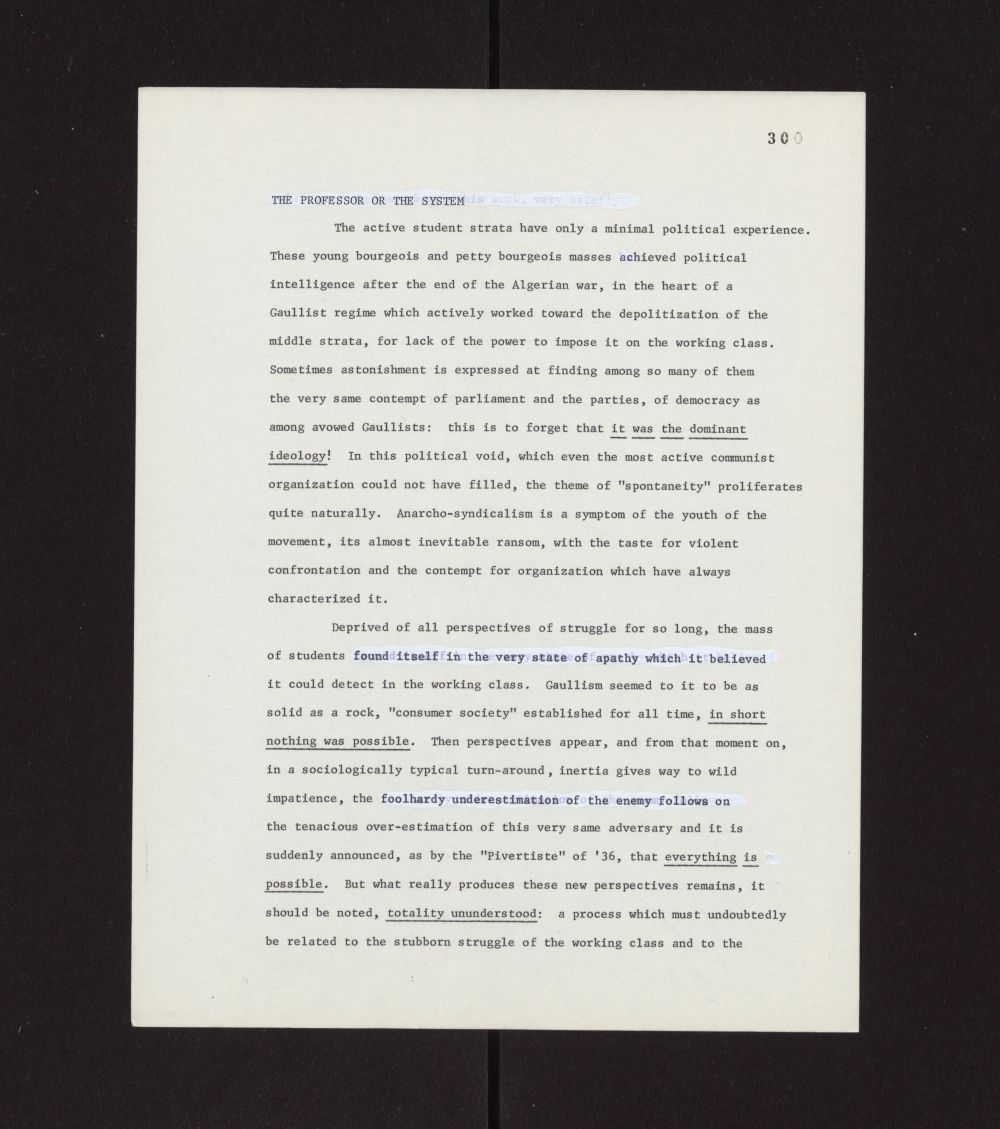

THE PROFESSOR OR THE SYSTEM
The active student strata have only a minimal political experience.
These young bourgeois and petty bourgeois masses achieved political
intelligence after the end of the Algerian war, in the heart of a
Gaullist regime which actively worked toward the depolitization of the
middle strata, for lack of the. power to impose it on the working class.
Sometimes astonishment is expressed at finding among so many of them
the very same contempt of parliament and the parties, of democracy as
among avowed Gaullists: this is to forget that it was the dominant
ideology! In this political void, which even the most active communist
organization could not have filled, the theme of "spontaneity" proliferates
quite naturally. Anarcho-syndicalism is a symptom of the youth of the
movement, its almost inevitable ransom, with the taste for violent
confrontation and the contempt for organization which have always
characterized it.
These young bourgeois and petty bourgeois masses achieved political
intelligence after the end of the Algerian war, in the heart of a
Gaullist regime which actively worked toward the depolitization of the
middle strata, for lack of the. power to impose it on the working class.
Sometimes astonishment is expressed at finding among so many of them
the very same contempt of parliament and the parties, of democracy as
among avowed Gaullists: this is to forget that it was the dominant
ideology! In this political void, which even the most active communist
organization could not have filled, the theme of "spontaneity" proliferates
quite naturally. Anarcho-syndicalism is a symptom of the youth of the
movement, its almost inevitable ransom, with the taste for violent
confrontation and the contempt for organization which have always
characterized it.
Deprived of all perspectives of struggle for so long, the mass
of students found itself in the very state of apathy which it believed
it could detect in the working class. Gaullism seemed to it to be as
solid as a rock, "consumer society" established for all time, in short
nothing was possible. Then perspectives appear, and from that moment on,
in a sociologically typical turn-around , inertia gives way to wild
impatience, the foolhardy underestimation of the follows on
the tenacious over-estimation of this very same adversary and it is
suddenly announced, as by the "Pivertiste" of '36, that everything is
possible. But what really produces these new perspectives remains, it
should be noted, totality ununderstood; a process which must undoubtedly
be related to the stubborn struggle of the working class and to the
of students found itself in the very state of apathy which it believed
it could detect in the working class. Gaullism seemed to it to be as
solid as a rock, "consumer society" established for all time, in short
nothing was possible. Then perspectives appear, and from that moment on,
in a sociologically typical turn-around , inertia gives way to wild
impatience, the foolhardy underestimation of the follows on
the tenacious over-estimation of this very same adversary and it is
suddenly announced, as by the "Pivertiste" of '36, that everything is
possible. But what really produces these new perspectives remains, it
should be noted, totality ununderstood; a process which must undoubtedly
be related to the stubborn struggle of the working class and to the
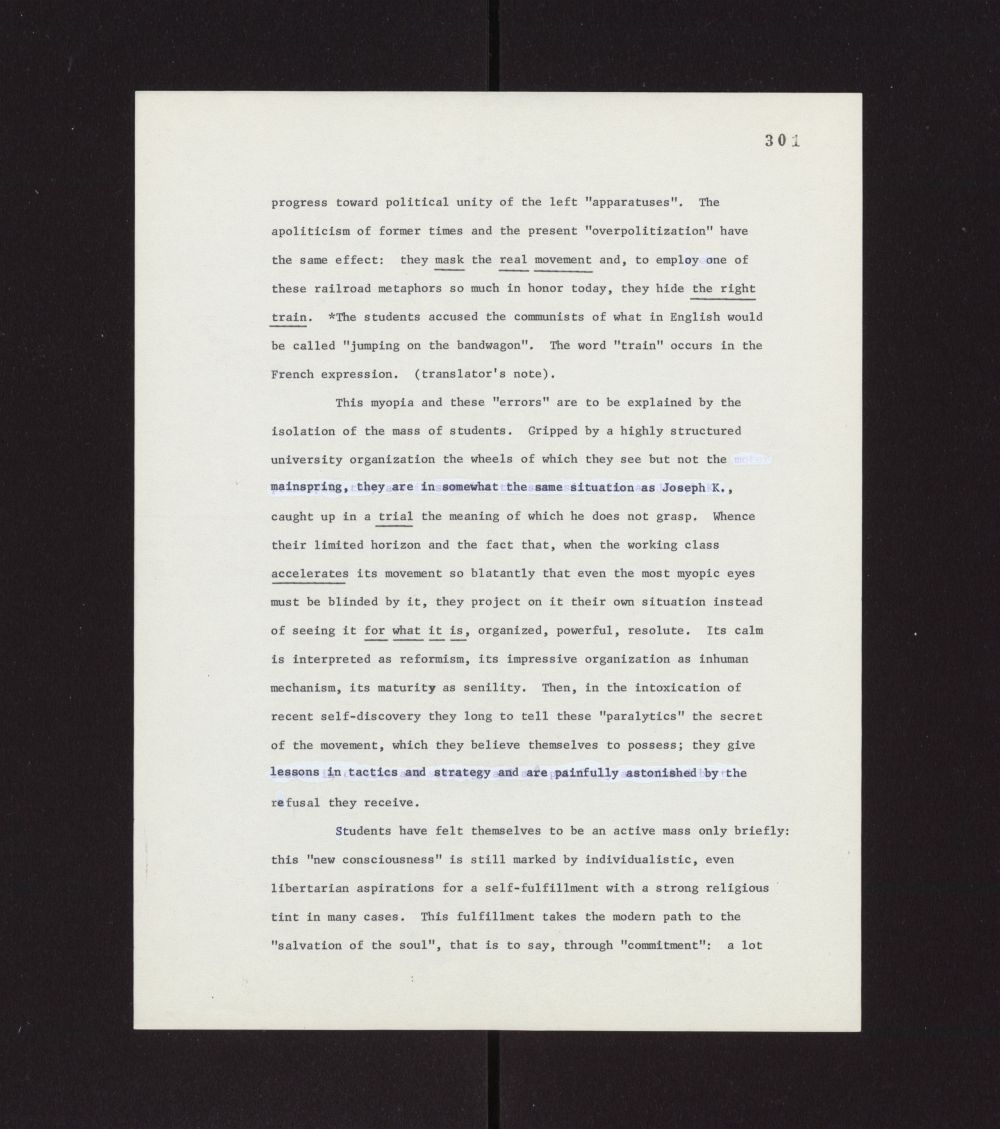

progress toward political unity of the left "apparatuses". The
apolitlcism of former times and the present "overpolltlzatlon" have
the same effect: they mask the real movement and, to employ one of
these railroad metaphors so much In honor today, they hide the right
train, *The students accused the communists of what In English would
apolitlcism of former times and the present "overpolltlzatlon" have
the same effect: they mask the real movement and, to employ one of
these railroad metaphors so much In honor today, they hide the right
train, *The students accused the communists of what In English would
be called "Jumping on the bandwagon". The word "train" occurs in the
French expression, (translator's note).
French expression, (translator's note).
This myopia and these "errors" are to be explained by the
isolation of the mass of students. Gripped by a highly structured
university organization the wheels of which they see but not the
mainspring, they In the situation as Joseph K.,
caught up In a trial the meaning of which he does not grasp. Whence
their limited horizon and the fact that, when the working class
accelerates Its movement so blatantly that even the most myopic eyes
must be blinded by it, they project on it their own situation Instead
of seeing it for what it is, organized, powerful, resolute. Its calm
is interpreted as reformism, Its impressive organization as Inhuman
mechanism, Its maturity as senility. Then, In the Intoxication of
recent self-discovery they long to tell these "paralytics" the secret
of the movement, which they believe themselves to possess; they give
lessons in tactics strategy and are painfully astonished by the
refusal they receive,
isolation of the mass of students. Gripped by a highly structured
university organization the wheels of which they see but not the
mainspring, they In the situation as Joseph K.,
caught up In a trial the meaning of which he does not grasp. Whence
their limited horizon and the fact that, when the working class
accelerates Its movement so blatantly that even the most myopic eyes
must be blinded by it, they project on it their own situation Instead
of seeing it for what it is, organized, powerful, resolute. Its calm
is interpreted as reformism, Its impressive organization as Inhuman
mechanism, Its maturity as senility. Then, In the Intoxication of
recent self-discovery they long to tell these "paralytics" the secret
of the movement, which they believe themselves to possess; they give
lessons in tactics strategy and are painfully astonished by the
refusal they receive,
Students have felt themselves to be an active mass only briefly:
this "new consciousness" is still marked by individualistic, even
libertarian aspirations for a self-fulfillment with a strong religious
tint in many cases. This fulfillment takes the modern path to the
"salvation of the soul", that is to say, through "commitment": a lot
this "new consciousness" is still marked by individualistic, even
libertarian aspirations for a self-fulfillment with a strong religious
tint in many cases. This fulfillment takes the modern path to the
"salvation of the soul", that is to say, through "commitment": a lot
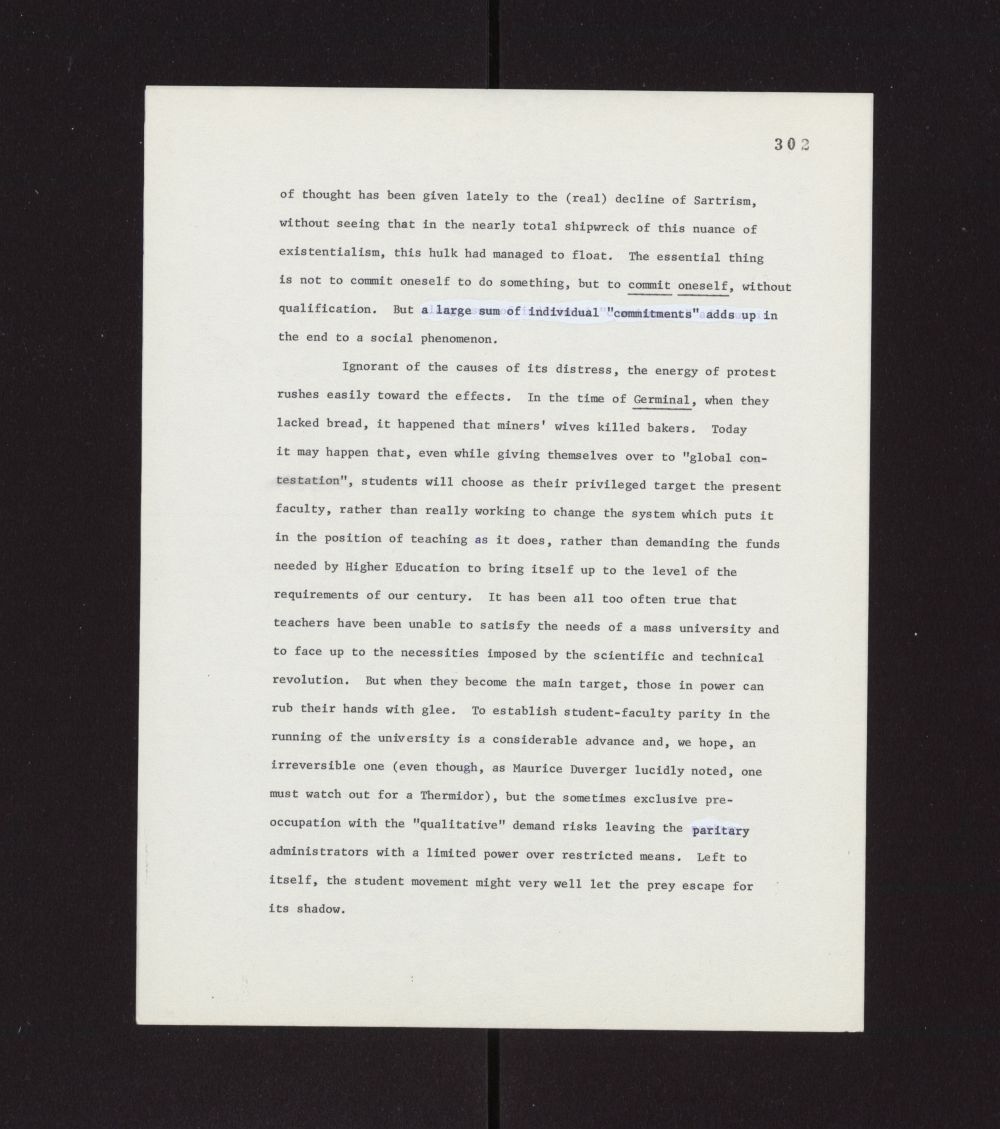

302
of thought has been given lately to the (real) decline of Sartrism,
without seeing that in the nearly total shipwreck of this nuance of
existentialism, this hulk had managed to float. The essential thing
Is not to commit oneself to do something, but to commit oneself, without
qualification. But a large of individual "commitments" adds up in
the end to a social phenomenon,
without seeing that in the nearly total shipwreck of this nuance of
existentialism, this hulk had managed to float. The essential thing
Is not to commit oneself to do something, but to commit oneself, without
qualification. But a large of individual "commitments" adds up in
the end to a social phenomenon,
Ignorant of the causes of its distress, the energy of protest
rushes easily toward the effects. In the time of Germinal, when they
lacked bread, it happened that miners' wives killed bakers. Today
It may happen that, even while giving themselves over to "global con-
testation", students will choose as their privileged target the present
faculty, rather than really working to change the system which puts it
in the position of teaching as It does, rather than demanding the funds
needed by Higher Education to bring itself up to the level of the
requirements of our century. It has been all too often true that
teachers have been unable to satisfy the needs of a mass university and
to face up to the necessities imposed by the scientific and technical
revolution. But when they become the main target, those in power can
rub their hands with glee. To establish student-faculty parity in the
running of the university is a considerable advance and, we hope, an
Irreversible one (even though, as Maurice Duverger lucidly noted, one
must watch out for a Thermidor), but the sometimes exclusive pre-
occupation with the "qualitative" demand risks leaving the paritary
administrators with a limited power over restricted means. Left to
itself, the student movement might very well let the prey escape for
its shadow.
rushes easily toward the effects. In the time of Germinal, when they
lacked bread, it happened that miners' wives killed bakers. Today
It may happen that, even while giving themselves over to "global con-
testation", students will choose as their privileged target the present
faculty, rather than really working to change the system which puts it
in the position of teaching as It does, rather than demanding the funds
needed by Higher Education to bring itself up to the level of the
requirements of our century. It has been all too often true that
teachers have been unable to satisfy the needs of a mass university and
to face up to the necessities imposed by the scientific and technical
revolution. But when they become the main target, those in power can
rub their hands with glee. To establish student-faculty parity in the
running of the university is a considerable advance and, we hope, an
Irreversible one (even though, as Maurice Duverger lucidly noted, one
must watch out for a Thermidor), but the sometimes exclusive pre-
occupation with the "qualitative" demand risks leaving the paritary
administrators with a limited power over restricted means. Left to
itself, the student movement might very well let the prey escape for
its shadow.
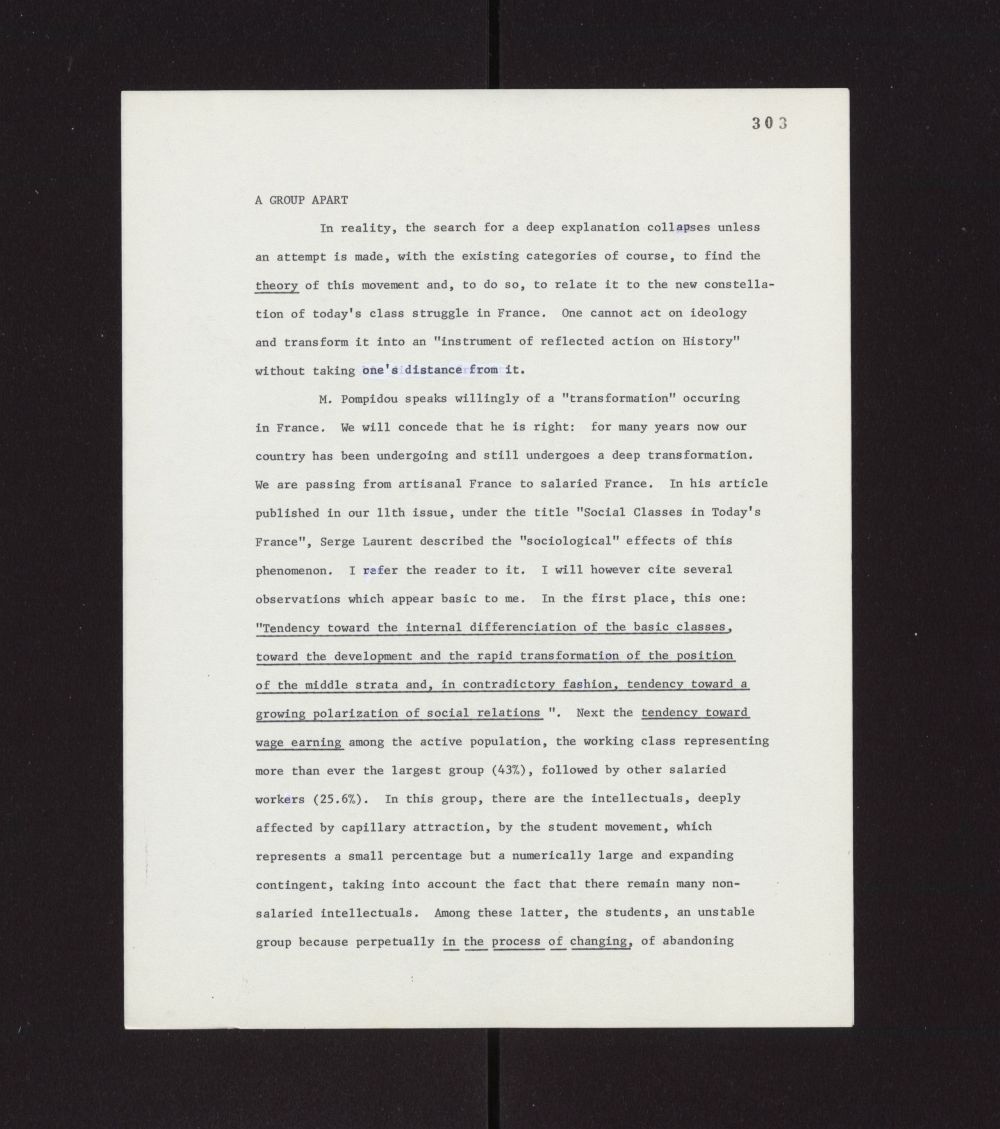

3 i 3
A GROUP APART
In reality, the search for a deep explanation collapses unless
an attempt is made, with the existing categories of course, to find the
jAeory_ of this movement and, to do so, to relate it to the new constella-
tion of today's class struggle in France, One cannot act on ideology
and transform it into an "instrument of reflected action on History"
without taking one's distance from it.
an attempt is made, with the existing categories of course, to find the
jAeory_ of this movement and, to do so, to relate it to the new constella-
tion of today's class struggle in France, One cannot act on ideology
and transform it into an "instrument of reflected action on History"
without taking one's distance from it.
M, Pompidou speaks willingly of a "transformation" occuring
in France. We will concede that he is right: for many years now our
country lias been undergoing and still undergoes a deep transformation.
We are passing from artisanal France to salaried France. In his article
published in our llth issue, under the title "Social Classes in Today's
France", Serge Laurent described the "sociological" effects of this
phenomenon, I refer the reader to it, I will however cite several
observations which appear basic to me. In the first place, this one:
in France. We will concede that he is right: for many years now our
country lias been undergoing and still undergoes a deep transformation.
We are passing from artisanal France to salaried France. In his article
published in our llth issue, under the title "Social Classes in Today's
France", Serge Laurent described the "sociological" effects of this
phenomenon, I refer the reader to it, I will however cite several
observations which appear basic to me. In the first place, this one:
o f the b a sic cl asses j,
toward the development and ^he^^
of the mMdle ^^
growing polarization^ of social ral_ations^ ". Next the tgndgngy toward^
wage^earning among the active population, the working class representing
more than ever the largest group (437o) , followed by other salaried
workers (25.6%). In this group, there are the intellectuals, deeply
affected by capillary attraction, by the student movement, which
more than ever the largest group (437o) , followed by other salaried
workers (25.6%). In this group, there are the intellectuals, deeply
affected by capillary attraction, by the student movement, which
represents a small percentage but a numerically large and expanding
contingent, taking into account the fact that there remain many non-
salaried intellectuals. Among these latter, the students, an unstable
group because perpetually in the process of changing, of abandoning
contingent, taking into account the fact that there remain many non-
salaried intellectuals. Among these latter, the students, an unstable
group because perpetually in the process of changing, of abandoning
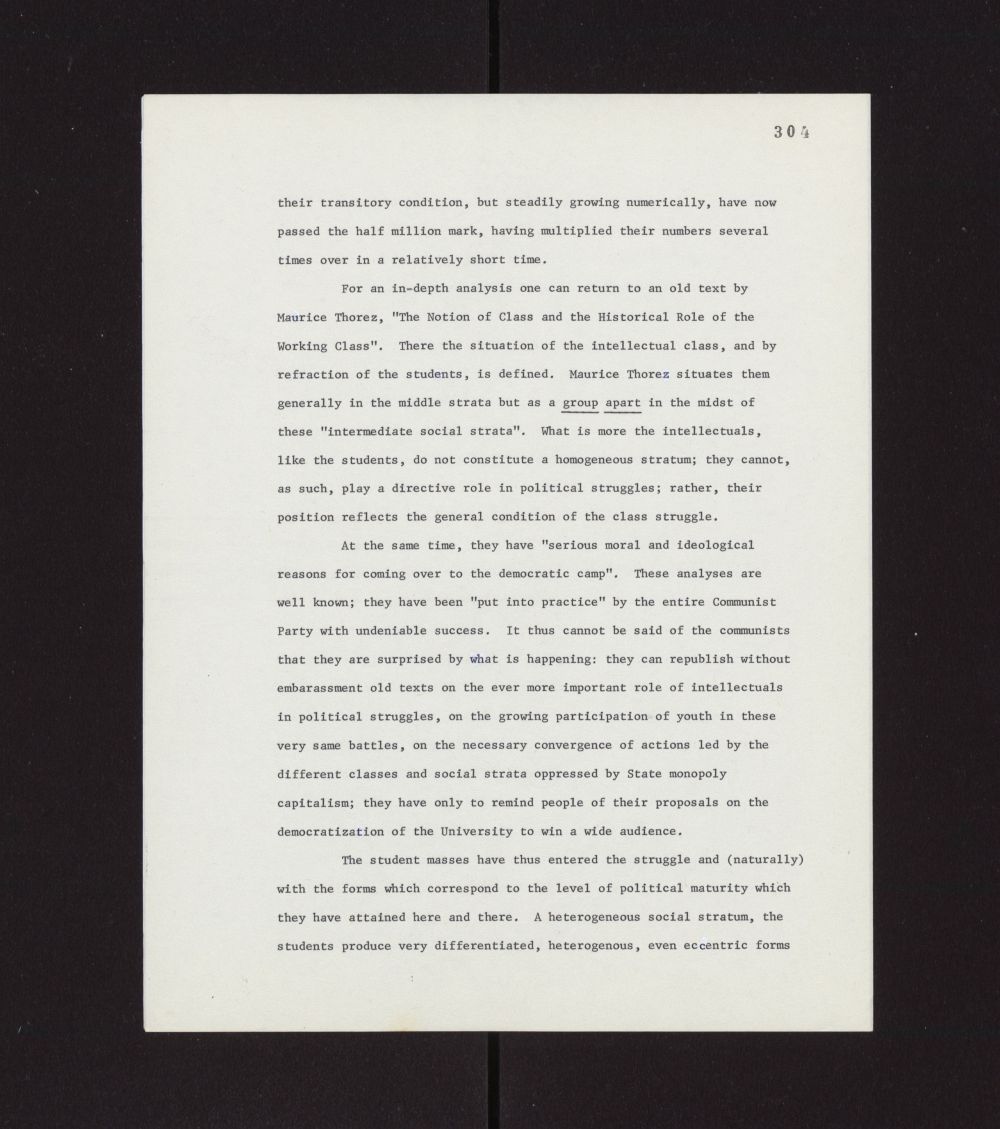

30
their transitory condition, but steadily growing numerically, have now
passed the half million mark, having multiplied their numbers several
times over in a relatively short time.
passed the half million mark, having multiplied their numbers several
times over in a relatively short time.
For an in-depth analysis one can return to an old text by
Maurice Thorez, "The Notion of Class and the Historical Role of the
Working Class". There the situation of the intellectual class, and by
refraction of the students, is defined, Maurice Thorez situates them
generally in the middle strata but as a group apart in the midst of
these "intermediate social strata". What is more the intellectuals,
like the students, do not constitute a homogeneous stratum; they cannot,
as such, play a directive role in political struggles; rather, their
position reflects the general condition of the class struggle.
Maurice Thorez, "The Notion of Class and the Historical Role of the
Working Class". There the situation of the intellectual class, and by
refraction of the students, is defined, Maurice Thorez situates them
generally in the middle strata but as a group apart in the midst of
these "intermediate social strata". What is more the intellectuals,
like the students, do not constitute a homogeneous stratum; they cannot,
as such, play a directive role in political struggles; rather, their
position reflects the general condition of the class struggle.
At the same time, they have "serious moral and ideological
reasons for coming over to the democratic camp". These analyses are
well known; they have been "put into practice" by the entire Communist
Party with undeniable success. It thus cannot be said of the communists
that they are surprised by what is happening: they can republish without
embarassment old texts on the ever more important role of intellectuals
in political struggles, on the growing participation of youth in these
very same battles, on the necessary convergence of actions led by the
different classes and social strata oppressed by State monopoly
capitalism; they have only to remind people of their proposals on the
democratization of the University to win a wide audience.
reasons for coming over to the democratic camp". These analyses are
well known; they have been "put into practice" by the entire Communist
Party with undeniable success. It thus cannot be said of the communists
that they are surprised by what is happening: they can republish without
embarassment old texts on the ever more important role of intellectuals
in political struggles, on the growing participation of youth in these
very same battles, on the necessary convergence of actions led by the
different classes and social strata oppressed by State monopoly
capitalism; they have only to remind people of their proposals on the
democratization of the University to win a wide audience.
The student masses have thus entered the struggle and (naturally)
with the forms which correspond to the level of political maturity which
they have attained here and there. A heterogeneous social stratum, the
students produce very differentiated, heterogenous, even eccentric forms
with the forms which correspond to the level of political maturity which
they have attained here and there. A heterogeneous social stratum, the
students produce very differentiated, heterogenous, even eccentric forms
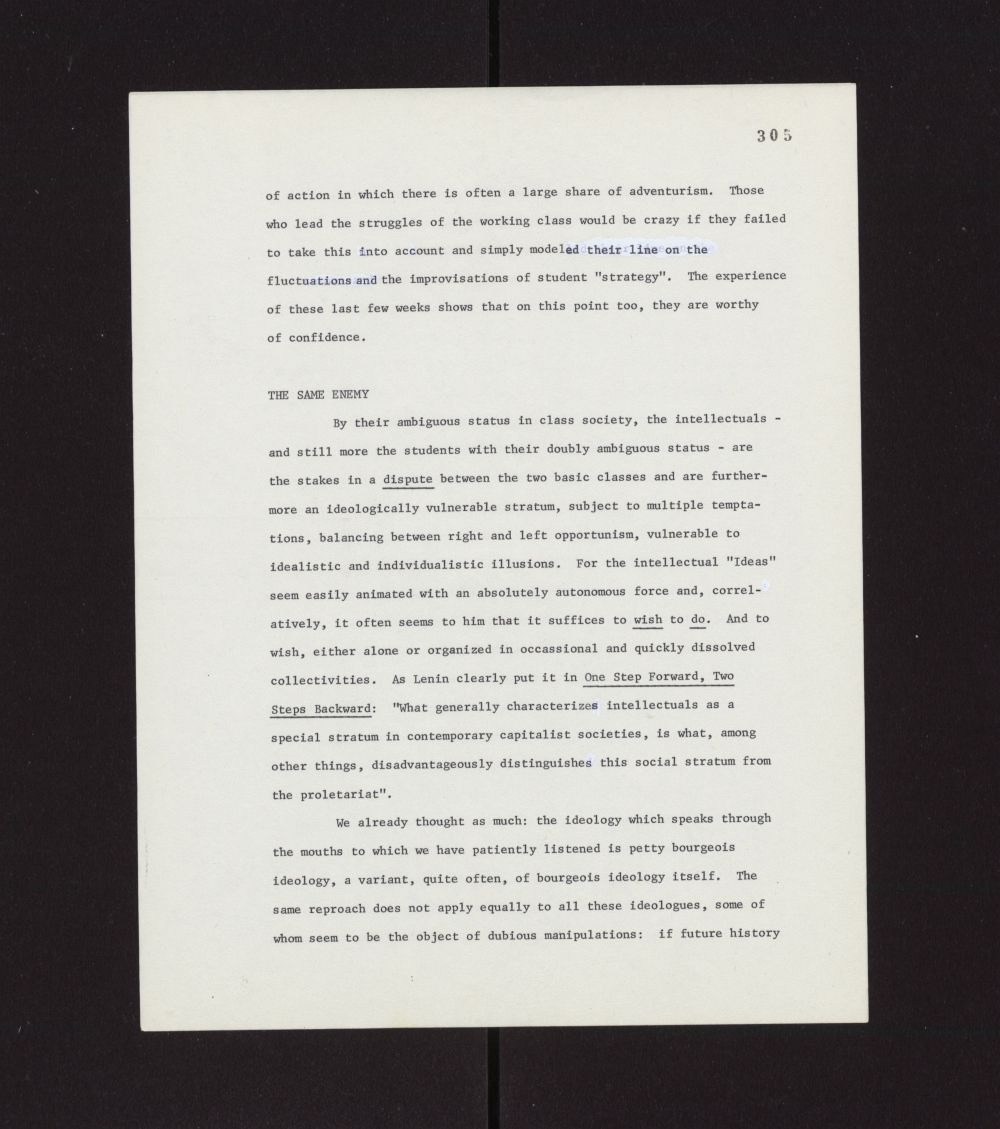

so •>
of action In which there is often a large share of adventurism. Those
who lead the struggles of the working class would be crazy if they failed
to take this into account and simply modeled their line on the
fluctuations and the improvisations of student "strategy". The experience
of these last few weeks shows that on this point too, they are worthy
of confidence.
who lead the struggles of the working class would be crazy if they failed
to take this into account and simply modeled their line on the
fluctuations and the improvisations of student "strategy". The experience
of these last few weeks shows that on this point too, they are worthy
of confidence.
THE
By their ambiguous status In class society, the intellectuals -
and still more the students with their doubly ambiguous status - are
the stakes in a dispute between the two basic classes and are further-
more an Ideologically vulnerable stratum, subject to multiple tempta-
tions, balancing between right and left opportunism, vulnerable to
Idealistic and Individualistic illusions. For the intellectual "Ideas"
seem easily animated with an absolutely autonomous force and, correl-
atively, it often seems to him that It suffices to wish to do. And to
wish, either alone or organized in occasslonal and quickly dissolved
collectivities. As Lenin clearly put It in One Step Forward, Two
Steps Backward: "What generally characterizes Intellectuals as a
special stratum in contemporary capitalist societies, is what, among
other things, dlsadvantageously distinguishes this social stratum from
the proletariat".
and still more the students with their doubly ambiguous status - are
the stakes in a dispute between the two basic classes and are further-
more an Ideologically vulnerable stratum, subject to multiple tempta-
tions, balancing between right and left opportunism, vulnerable to
Idealistic and Individualistic illusions. For the intellectual "Ideas"
seem easily animated with an absolutely autonomous force and, correl-
atively, it often seems to him that It suffices to wish to do. And to
wish, either alone or organized in occasslonal and quickly dissolved
collectivities. As Lenin clearly put It in One Step Forward, Two
Steps Backward: "What generally characterizes Intellectuals as a
special stratum in contemporary capitalist societies, is what, among
other things, dlsadvantageously distinguishes this social stratum from
the proletariat".
We already thought as much: the Ideology which speaks through
the mouths to which we have patiently listened Is petty bourgeois
Ideology, a variant, quite often, of bourgeois Ideology Itself, The
same reproach does not apply equally to all these Ideologues, some of
whom seem to be the object of dubious manipulations: If future history
the mouths to which we have patiently listened Is petty bourgeois
Ideology, a variant, quite often, of bourgeois Ideology Itself, The
same reproach does not apply equally to all these Ideologues, some of
whom seem to be the object of dubious manipulations: If future history
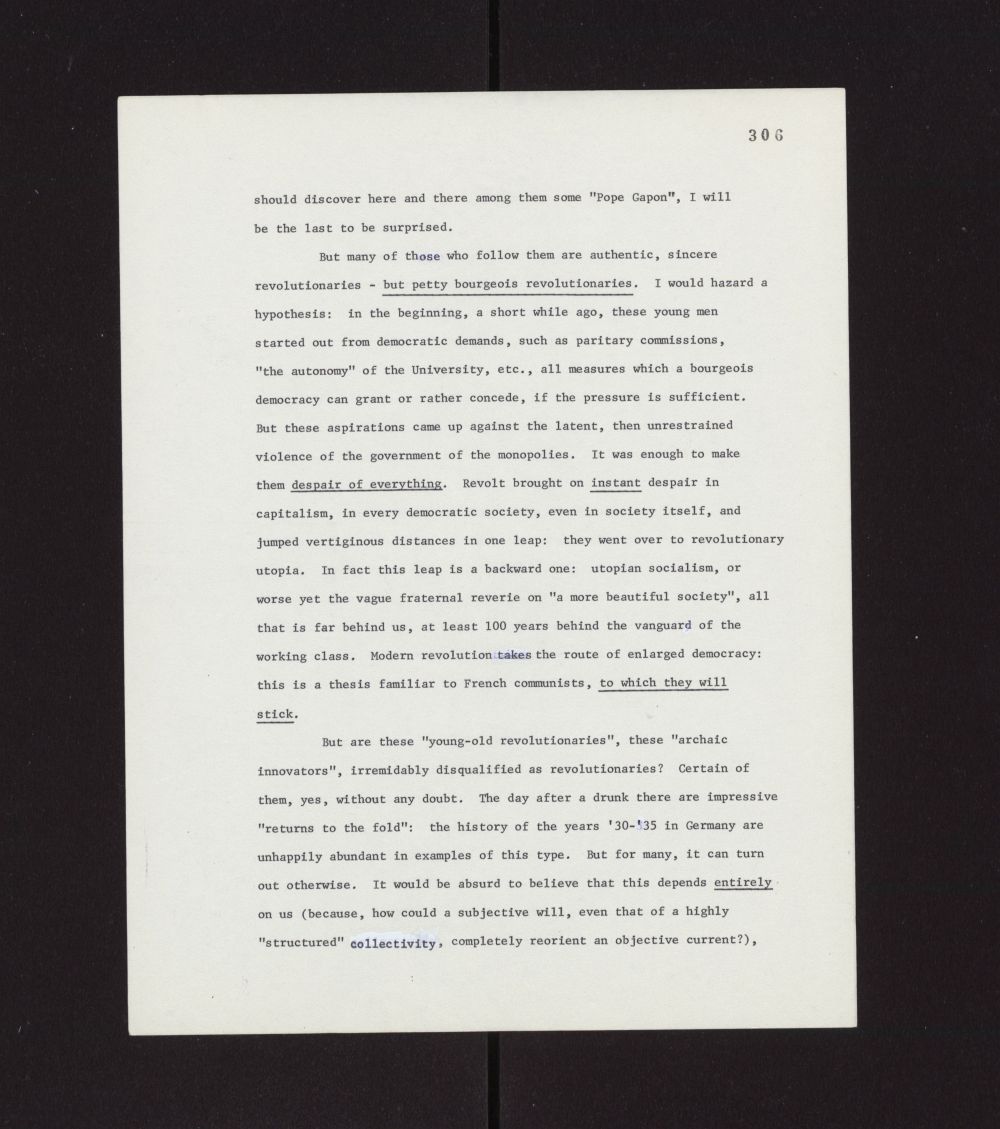

30
o
should discover here and there among them some "Pope Gapon'% I will
be the last to be surprised,
be the last to be surprised,
But many of those who follow them are authentic, sincere
revolutionaries - but petty bourgeois revolutionaries. I would hazard a
hypothesis: in the beginning, a short while ago, these young men
started out from democratic demands, such as paritary commissions,
"the autonomy" of the University, etc., all measures which a bourgeois
democracy can grant or rather concede, if the pressure is sufficient.
But these aspirations came up against the latent, then unrestrained
violence of the government of the monopolies. It was enough to make
them ^e££ajLr__p_f_evBj2lthlng.« Revolt brought on instant despair in
capitalism, in every democratic society, even in society itself, and
jumped vertiginous distances In one leap: they went over to revolutionary
Utopia. In fact this leap is a backward one: Utopian socialism, or
worse yet the vague fraternal reverie on "a more beautiful society", all
that is far behind us, at least 100 years behind the vanguard of the
working class. Modern revolution takes the route of enlarged democracy:
this is a thesis familiar to French communists, to which they will
stick.
revolutionaries - but petty bourgeois revolutionaries. I would hazard a
hypothesis: in the beginning, a short while ago, these young men
started out from democratic demands, such as paritary commissions,
"the autonomy" of the University, etc., all measures which a bourgeois
democracy can grant or rather concede, if the pressure is sufficient.
But these aspirations came up against the latent, then unrestrained
violence of the government of the monopolies. It was enough to make
them ^e££ajLr__p_f_evBj2lthlng.« Revolt brought on instant despair in
capitalism, in every democratic society, even in society itself, and
jumped vertiginous distances In one leap: they went over to revolutionary
Utopia. In fact this leap is a backward one: Utopian socialism, or
worse yet the vague fraternal reverie on "a more beautiful society", all
that is far behind us, at least 100 years behind the vanguard of the
working class. Modern revolution takes the route of enlarged democracy:
this is a thesis familiar to French communists, to which they will
stick.
But are these "young-old revolutionaries", these "archaic
Innovators", irretnidably disqualified as revolutionaries? Certain of
them, yes, without any doubt. The day after a drunk there are Impressive
"returns to the fold": the history of the years '30-'35 in Germany are
unhappily abundant In examples of this type. But for many, it can turn
out otherwise. It would be absurd to believe that this depends entirely •
on us (because, how could a subjective will, even that of a highly
"structured" collectivity 5 completely reorient an objective current?),
Innovators", irretnidably disqualified as revolutionaries? Certain of
them, yes, without any doubt. The day after a drunk there are Impressive
"returns to the fold": the history of the years '30-'35 in Germany are
unhappily abundant In examples of this type. But for many, it can turn
out otherwise. It would be absurd to believe that this depends entirely •
on us (because, how could a subjective will, even that of a highly
"structured" collectivity 5 completely reorient an objective current?),
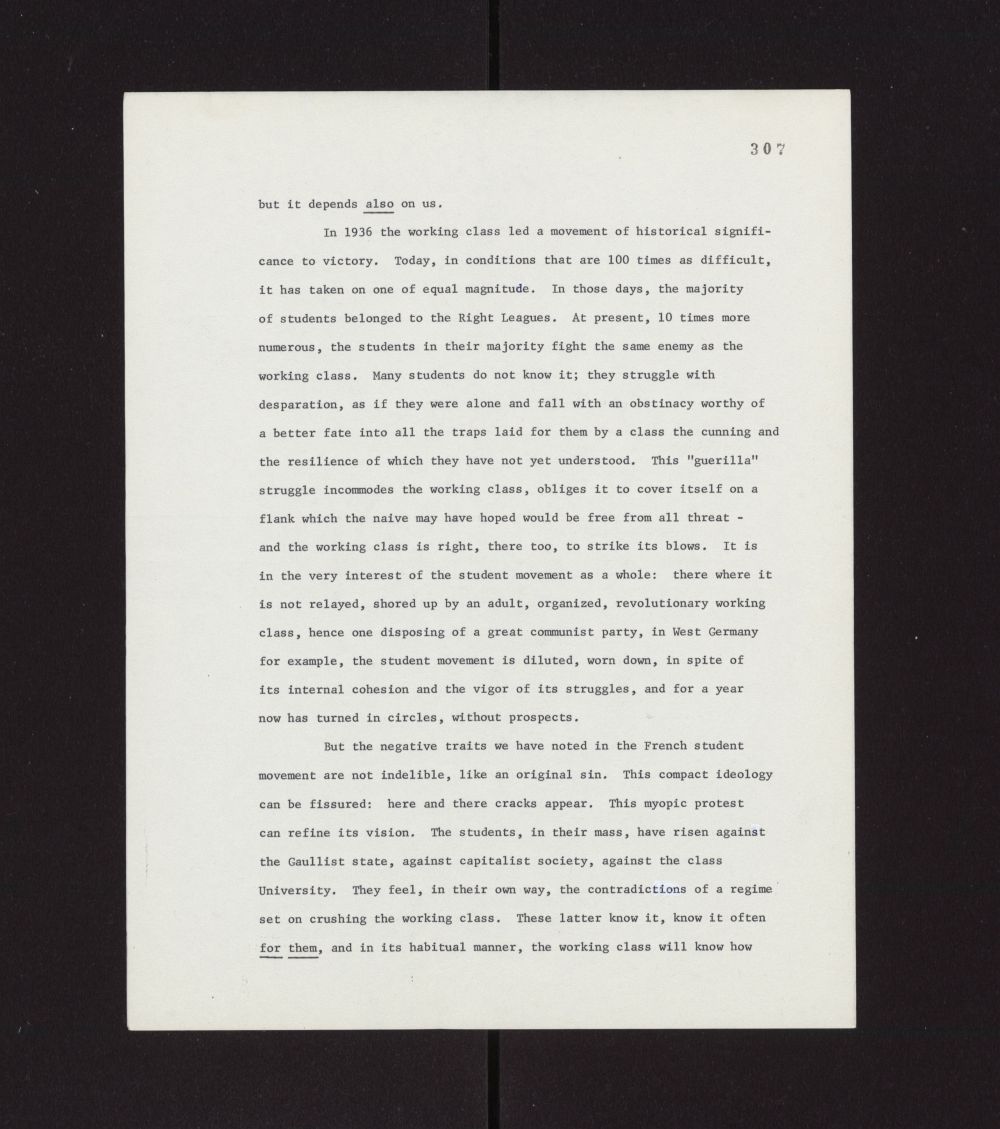

but It depends also on us,
In 1936 the working class led a movement of historical signifi-
cance to victory. Today, In conditions that are 100 times as difficult,
It has taken on one of equal magnitude. In those days, the majority
of students belonged to the Right Leagues, At present, 10 times more
numerous, the students In their majority fight the same enemy as the
working class. Many students do not know It; they struggle with
desparation, as If they were alone and fall with an obstinacy worthy of
a better fate Into all the traps laid for them by a class the cunning and
the resilience of which they have not yet understood. This "guerilla"
struggle incommodes the working class, obliges It to cover itself on a
flank which the naive may have hoped would be free from all threat -
and the working class Is right, there too, to strike its blows. It Is
in the very Interest of the student movement as a whole: there where It
is not relayed, shored up by an adult, organized, revolutionary working
class, hence one disposing of a great communist party, In West Germany
for example, the student movement is diluted, worn down, in spite of
Its Internal cohesion and the vigor of Its struggles, and for a year
now has turned in circles, without prospects,
cance to victory. Today, In conditions that are 100 times as difficult,
It has taken on one of equal magnitude. In those days, the majority
of students belonged to the Right Leagues, At present, 10 times more
numerous, the students In their majority fight the same enemy as the
working class. Many students do not know It; they struggle with
desparation, as If they were alone and fall with an obstinacy worthy of
a better fate Into all the traps laid for them by a class the cunning and
the resilience of which they have not yet understood. This "guerilla"
struggle incommodes the working class, obliges It to cover itself on a
flank which the naive may have hoped would be free from all threat -
and the working class Is right, there too, to strike its blows. It Is
in the very Interest of the student movement as a whole: there where It
is not relayed, shored up by an adult, organized, revolutionary working
class, hence one disposing of a great communist party, In West Germany
for example, the student movement is diluted, worn down, in spite of
Its Internal cohesion and the vigor of Its struggles, and for a year
now has turned in circles, without prospects,
But the negative traits we have noted In the French student
movement are not Indelible, like an original sin. This compact Ideology
can be fissured: here and there cracks appear. This myopic protest
can refine Its vision. The students, In their mass, have risen against
the Gaullist state, against capitalist society, against the class
University, They feel, In their own way, the contradictions of a regime
set on crushing the working class. These latter know It, know It often
for them, and In its habitual manner, the working class will know how
movement are not Indelible, like an original sin. This compact Ideology
can be fissured: here and there cracks appear. This myopic protest
can refine Its vision. The students, In their mass, have risen against
the Gaullist state, against capitalist society, against the class
University, They feel, In their own way, the contradictions of a regime
set on crushing the working class. These latter know It, know It often
for them, and In its habitual manner, the working class will know how
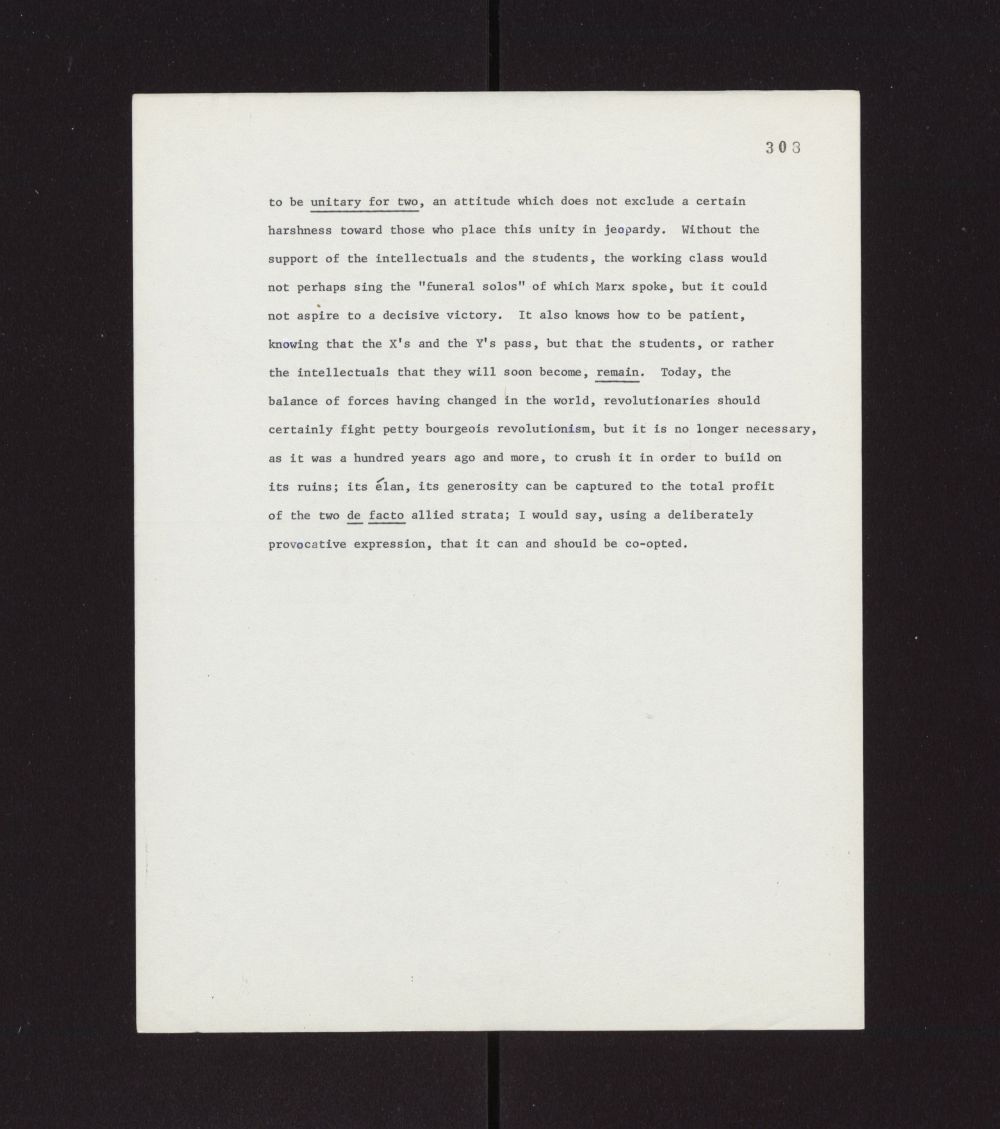

3 0 3
to be unitary for two, an attitude which does not exclude a certain
harshness toward those who place this unity in jeopardy. Without the
support of the intellectuals and the students, the working class would
not perhaps sing the "funeral solos" of which Marx spoke, but it could
not aspire to a decisive victory. It also knows how to be patient,
knowing that the X's and the Y's pass, but that the students, or rather
the intellectuals that they will soon become, remain. Today, the
balance of forces having changed in the world, revolutionaries should
certainly fight petty bourgeois revolutionism, but it is no longer necessary,
as it was a hundred years ago and more, to crush it in order to build on
its ruins; its elan, its generosity can be captured to the total profit
of the two de facto allied strata; I would say, using a deliberately
provocative expression, that it can and should be co-opted.
harshness toward those who place this unity in jeopardy. Without the
support of the intellectuals and the students, the working class would
not perhaps sing the "funeral solos" of which Marx spoke, but it could
not aspire to a decisive victory. It also knows how to be patient,
knowing that the X's and the Y's pass, but that the students, or rather
the intellectuals that they will soon become, remain. Today, the
balance of forces having changed in the world, revolutionaries should
certainly fight petty bourgeois revolutionism, but it is no longer necessary,
as it was a hundred years ago and more, to crush it in order to build on
its ruins; its elan, its generosity can be captured to the total profit
of the two de facto allied strata; I would say, using a deliberately
provocative expression, that it can and should be co-opted.
Category
Title
A Critique
Date
06/1968
Translation of
Keywords